#anti mexican sentiment is still very much high
Text
A mother who was the target of a woman’s anti-Mexican rant at a Disneyland bathroom recalls the startling confrontation as her toddler was with her.
The bathroom exchange happened on Dec. 5 when Eva Ramirez filmed the woman’s racist remarks after she reportedly heard the mother and son speaking Spanish in the bathroom.
Ramirez was celebrating her 2-year-old son’s birthday at the park.
“As we were walking into the restrooms, the stalls were empty and so I went ahead and used the big stall with my child and also with my stroller,” Ramirez said.
She heard two people outside the stall making rude comments but she was preoccupied with her son and didn’t realize they were actually directed towards her.
I’m having a conversation with my baby,” she recalled. “I’m letting him know what I’m doing. He’s learning to speak a lot more words.”
Ramirez was speaking Spanish to her son, part of her efforts to make him bilingual. When she exits the stall, a woman standing nearby suddenly starts yelling at her.
“The woman in the gray t-shirt started screaming at me and she started telling me to speak English in her country and that it was her country and ‘Please get out of her country,’” Ramirez recalled. “What I said to her was, ‘I was born here.’”
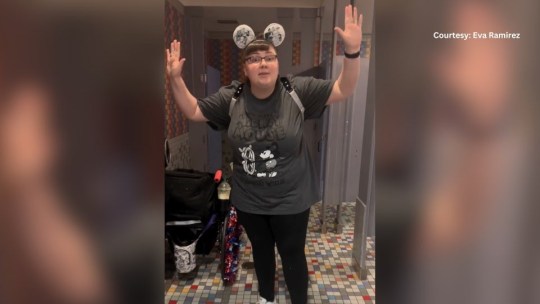
Ramirez said the racist tirade went on for about a minute. When her son started to cry, that’s when she knew the woman had gone too far. So she pulled out her phone and began recording her.
In the video, Ramirez is heard saying, “I’m at Disneyland and this person just heard me speaking Spanish and she said, ‘Great, you’re a f—–g Mexican, right?’ Repeat what you just said.”
Ramirez asks the woman, “You have a problem with people that speak Spanish in your country, right?”
“Yeah, but it’s America,” the unidentified woman responds. “You don’t speak Spanish in America. It’s an English-speaking country.”
Ramirez responds saying, “Your comment is racist and it has nothing to do with using the restroom.”
“I don’t care,” said the unidentified woman. “I hate Mexicans, it’s true. There it is.”
KTLA’s Shelby Nelson visited the home and attempted to speak with the unidentified woman but no one answered the door.
“You still have the people who think this is okay,” Ramirez said. “And they continue to do this despite being recorded. I don’t think anyone should tolerate it and most definitely not around your children because I feel that we can lead by example. If I had ignored her, my son would have felt like that’s okay and so what I’m doing now is teaching him that this is not tolerated wherever you are.”
Ramirez said she filed a complaint with Disneyland employees, asking them to not let the woman inside the park, but security refused the request “because it was only a verbal confrontation.”
#yeah I've had dumb racist people like this tell me 'sPeAk eNgLiSh' and when I clearly can they want me to ONLY speak english and it's like#btch I'm not giving up being billingual for your ass#🇲🇽#racism#discrimination against mexicans#usa#united states#disneyland#anyways friendly reminder to support your local mexican community#anti mexican sentiment is still very much high
6 notes
·
View notes
Note
I have a feeling your ask box and I are going to be familiar. You might be hot-taked out after that killer Satomi discourse. But whenever you’ve got it in you, I’d sure love to hear what you think about Kira and her Jeff-deemed-absolutely-necessary departure.
Oh, definitely. And I do love content, so...
Kira Yukimura was done so dirty by the writers and Jeffrey “I’m not racist I’ll prove it by arguing to poc calling me out for it on twitter” Davis. Her treatment was racist, tokenizing, and it wasn’t even high-brow racism. It was sloppy and lazy. If you’re gonna write all your characters of color off the show, commit to it. She went to the desert like 5 times before she stayed. Cowards.
Kira was only meant to be on the show for the Nogitsune storyline in 3b. However, fans liked her so much that, as with Theo in season 6, she was brought back for more episodes. The difference is that Cody Christian is white-passing and male and Arden Cho is not. Female characters don’t exist on Teen Wolf without a relationship to a male character. Hayden existed for Liam. Tracy existed for Theo. Melissa existed for Scott and Argent. Allison existed for Scott. Lydia, the female character with the most screentime of all of them, spent a lot of her time existing in relationship to Jackson, Stiles, Parrish (shudder), and other male main characters. Women on the show were reduced to love interests and mothers more often than not, and Kira was the same.
I loved her character. I loved her arc. I loved Arden Cho, who in real life is as sweet and kind as her character. I enjoyed her parents, both Noshiko, who’s surprisingly funny and a total badass, and Ken, who’s the most wholesome man in the universe. The only straight man we stan. I love him.
Anyways, Kira was getting a fun arc outside of being Scott’s girlfriend, with her parents and her powers and all, and then wham, white-passing boy shows up and no more main character status for Kira. Guess there wasn’t enough room to keep the only interesting plot line of all the ones happening in s5. Personally, I would have chosen Kira over the Marrish garbage fire of underage relationships, but that’s just me.
Then. The Skinwalkers. I could write a whole essay about them, but this is a Kira post, so I’ll limit it to her. At least Luther got sent to the moon for a reason. Kira got sent to the desert for “rEaSoNs”. There was no indication that her power was out of control, but every indication it wasn’t. She was growing and learning. Then, suddenly, she was “too powerful” so she had to go to the desert and disappear for a few episodes and then go back and forth for a while before they wrapped up sending Theo to the upside down or wherever he went and she could finally go... hang out with the people who we were told could help her control her power but who only threw spears at her and gave her a season finale ex machina. Then back to the desert with you!
You can tell something was going on backstage in her treatment. Arden Cho wasn’t informed she was being cut, she had to be told by fans. Her departure was carried out as swiftly as possible, and not for any real reason. Kira would have been tremendously helpful against the hunters and in a lot of later scenes, against the Ghost Riders (and let me remind everyone that KIRA WAS THE ONE WHO TOLD LYDIA ABOUT THE WILD HUNT), against pretty much anything. Immune to electrocution? Don’t help with the hunters who love electrocuting people. Sloppy writing through and through.
And what’s more is that Kira was cut just in time for the Scalia thing, which was so fucking rushed oh my GOD nothing has ever been less natural- this is a Kira post, calm down capsicle. Anyways, Kira got replaced as Scott’s love interest and not much else by a white girl, no hate on Malia or Shelley but much on the writers. I loved Malia and Kira’s friendship, and if anyone should have gotten with Malia, it should have been Kira. (The first time I saw Malia I wondered if we were getting another ambiguously brown character, actually, but no, just Georgian and well-tanned. But I bet not all my followers knew Tracy was played by a Chinese and Cherokee actor. Or that Nolan was played by a Mexican and Caxcan actor. Or that Theo was played by a Penobscot Native actor. The list goes on of white-passing POC who got to stay marginally longer than Black or brown characters.) The “Scott ends up with a white girl he has no chemistry with” threw me for many loops, especially after I was surprised to find myself liking Scira, even though I’m usually bored by straight relationships because of their one-sided focus and nonexistent chemistry. Kira got to be a character outside of Scott, and I liked their romance better for it, and then desert for a thousand years!
TLDR on the canon end of things is that Kira and Arden were done dirty by a group of powerful white men who wanted to tell a cishet white story.
Now, on the fandom end of things, I’m stepping into the real hot water. It’s safe to say that Kira’s story was sloppy and Arden didn’t deserve that ending, but it’s less safe to say that this fandom doesn’t treat her that well either. Here’s the most popular x Scott ships on Ao3, under the Teen Wolf tag with no other filters.

Scott and Allison. Scott and Stiles. Scott and Isaac. Then Scott and Kira, in dead last. Scott and Malia don’t even make the top ships list, probably because of how rushed and sloppy it was, but I digress.
People love Scott and Allison a lot, and I get that. I liked her too. I was also sad when she died. But, unlike a lot of sentiment I see in this fandom, I don’t think she should have been brought back to fight the beast in season 5 and get back with Scott. Not only do I think bringing characters back to life without very good reason and explanation (which they wouldn’t have, come on) cheapens their death, and that bringing characters back to life is weak storytelling in general, but let’s recall that Scira is still a thing in season 5. They’re still madly in love when Kira leaves. Allison should not have come back and love-triangled so Kira could be written off for a different white girl or so the massive amount of young white girls in the fandom who love Allison would be angry at Kira for breaking up their OTP. That would have been the one thing that could have made season 5 worse. (Well, they could have made Marrish a thing or killed Mason, but Jeff Davis thought about it and a shiver went down his spine because the ghost of Christmas future hears my name in its nightmares.)
Even if people aren’t “bring Allison back” campers, they largely ignore Kira’s entire existence. People who post gifsets and posts about Allison or Lydia don’t give anywhere near the same amount of attention to Kira. I see more Malia posts, actually. And while all of them had more runtime than Kira, none of them paired with Scott quite as perfectly, or had such strong independent storylines. Lydia almost did, but it kept petering out and she kept going back to main plot only. I see lots of appreciation posts for Allison and Lydia and Malia and the men, obviously, but NOTHING for Kira or Arden Cho. We all know what happened backstage because we read the same post in 2016 or whenever and then we all stopped talking about it.
Even the racism in this fandom skips Kira. Scott antis, I’m looking (controversially) at you. I’m glad Kira isn’t the subject of a bunch of obvious racism (as much as “bring Allison back!” makes it subtle), but not because she’s a forgotten side character. Kira made the main credit sequence! She has a sword! What else could you all POSSIBLY want?
And here’s where I burn at the stake: Kira was written off her own damn “look Fun Japanese mythology” storyline half the time so it could center around Stiles. A white boy. There were numerous issues with the mythology before that — “Oni” means demon, not “firefly samurai ninja”, and it refers to a similar mythology as the western “fae”, a large collection of creatures benevolent, malevolent, and in between, with different traits and origins. Kitsunes are meant to be red or white, not gold, and they’re foxes, not cats, animation team. “Nogitsune” refers to the malevolent class of “low” Kitsune, or “wild” Kitsune, who didn’t align themselves with the goddess Inari and do divine and pious work. There are many of them and the most they really do is harass people at shrines, not murder indiscriminately for funsies. They’re only malevolent in that they like doing bad deeds, not that they’re serial killers. And they’re not one of the usual 13 low Kitsune, two of which are bad of their own accord! (Spirit and Air. Google it!) They are meant to be dealt with by Inari-aligned high Kitsune, not your average tricky fox. Among other things.
So Stiles. Outside of the Kira storyline, he’s used in a lot of fandom discourse about racism and sexism. And queerbaiting. Y’all love a scrawny white boy. Anyways, Stiles gets possessed by the Nogitsune (that’s NOT how that works but okay Jeffrey) and suddenly s3 is about him. Kira’s not evil, now let’s look at Stiles being tired and messy and killing people. Dylan #1 did a great job playing that part, no hate on him, but the fact that a white boy became the main character in a Japanese (or Korean, if you’re Jeff, same thing) girl’s storyline is. Hmm. How do you call it? Blatant racism. And erasure. Which is racism. YIKES, Jeff. There is so much wrong with Stiles being the Nogitsune and controlling the Oni and his whole story (and oh my god the other guy who got possessed was also a white boy instead of a Japanese character played by the same actress Jesus fucking Christ). I’m not going into that, because that’s its own essay.
Anyways, because of how much this fandom loves Stiles, it’s easy to ignore how Kira and Japanese characters were treated. People project onto Stiles with glee. He’s white. He’s awkward. He’s (supposedly) not super attractive. (Yikes.) He’s ditzy and bouncy and all that fun stuff, but he also always saves the day. He got written off for most of 6b and he still saved the stupid day. And hey, dark!Stiles (let’s not get into calling him dark instead of Nogitsune that’s just too much wine we’d have to crack open to say it) is a fun trope and people like posting and creating about him. Except that he’s the white boy who took Kira’s storyline. Her independent story about Kitsune and the like was all given over to him, not just by the show, but by the fandom. So now every post about Kitsune is a Stiles post, even if it started with Kira. And because it’s Stiles, and this fandom loves him, and is easily offended by people leaning too hard on the glass house around them and him, Kira gets forgotten and swept aside. Everyone would rather talk about Stiles. Who is incapable of bad. Or cultural appropriation. But if you attack him you’re being ableist because he has ADHD. This is why I relate to Nolan for anxiety feels instead.
TLDR on the fandom end, y’all don’t treat Kira better than the show did. I see a few posts here and there from some dedicated users — typically the same people posting about Boyd, Deaton, Morrell, yeah that’s it I’m the only one posting about Kali. (Un-fun fact: Kali was not played by an Indian actor, but by a half-Black actor. Jeff Davis, when called out on twitter, said “wow ok idiots we tried to find an Indian actress but it was hard actually SUPER hard so shut up and stop telling me how to write MY show”, which is paraphrasing with intent to make fun, but exactly what he said.) Y’all who know about Arden and Kira should diversify your blogs to include more POC, especially ones where the actor AND character were rudely sidelined for vague white people reasons. Post gifs of Kira along with Allison, Lydia, and Malia. Post ship stuff of Scira too. Post about kitsunes, the origin story of the Nogitsune, when you post about the white boy who became the main character of that arc. Call the show out. Call the fandom out. Stop making every bit and piece of her story about Czechoslovakia White Boy. Demand Kira in any future runs of the show, if season 7 or whatever does happen. Include her in your fanfictions, in your headcanons, in your art. You don’t have to love her, but you have to remember that she’s as there as any of the white characters are.
This take is very hot. If I receive racist asks and/or messages about this, I’m going to make fun of each and every sender.
#teen wolf#that werewolf show#werewolves#kira yukimura#stiles stilinski#noshiko yukimura#ken yukimura#kitsune#kitsunes#asian representation#east asian representation#cultural appropriation#teen wolf discourse#hot takes#character asks#answered ask#ask me anything#warning: white boys being the center of someone else’s culture again#is this an anti stiles post#i didn’t mean it that way oops#no aggressively racist stiles stans in my inbox thx#he’s a fine character and it’s the writer and producer team’s fault#teen wolf did kira dirty#spilling tea#so much tea#i’m going to burn at the stake for this#some takes are too hot for the white girls in the fandom#yes that’s a joke about spicy foods#if y’all are gonna joke about asian water being spicy this is what you get in return
104 notes
·
View notes
Text
Again, I'm gonna meld my experience and something I just learned into Ichigo.
So, remember, I'm reading the whole "unusual haircolour" being of note as Ichigo being mixed, probably via Masaki, because Issin is coded VERY Japanese, either Yamato or Ainu, but not Ryukyuan. Masaki is not. Orihime's same colour of hair is not noted (only how pretty her hair is) nor is Chizuru's darker red. (Yeah, that one classmate has purple hair, but purple and blue are often stand-ins for shades of black, to differentiate, in a way of compensating for the lack of detailed faces. Brown is because brown to black is a scale--my own head and beard hair is very dark brown, and how black vs brown it looks depends on lighting, mostly. You can also read brown hair as "basically black" on characters like, say, Keigo, unless stated they're not Japanese/Asian, like Chad)
Some shows are pretty low on racial coding--these are often shows like...okay, I don't actually watch a lot of cartoons, but there are shows out there that might be slice-of-life or romance or something, where everyone's supposed to be Yamato Japanese, including the girl with lime green hair and purple eyes, which is basically for visual interest and easier character differentiation.
Bleach...is not that show. Not only are some noted in dialogue--again, Chad--but then Kisuke is inspired by a Scandinavian fairytale or something, and seriously, just hold Byakuya up against Tousen. I'm also pretty convinced Yoruichi's supposed to be Black, but Tousen or sea urchin guy is obvious.
I mean, I could go on about Shunsui convincingly reading European (or headcanoning him as Romani and growing out his hair in defiance of the Spanish), or how seriously no one ever read Grimmjow as Japanese, but canonically is pretty diverse. Kyouani kept it up with the Bounts who were clearly from Europe (remember the backstory of Cain and striped-hair guy and the boy that died?)
I mean, Soi-Fon, the Bount in the qi pao, Shaolong, and the fracción of Barragan (which is a real Spanish language last name, I forget what architect he was named for) with the braided hair are all super-duper Chinese-coded, but these are apparently codings the average Westerner misses. (I get maybe missing Barrangan's guy, but how the heck people miss the friggin guy named Shaolong...! Then again, I just saw keysmash fake-Japanese name in a Digimon 02 fic where it was really hard to take seriously a professor named "morning sickness." You can't make this up!)
So point one is that I've always felt like this was probably another thing that Kubo was stopped from doing by his editors, though "the world may never know" www but I've seriously long thought Ichigo was supposed to be mixed.
(of course, my nascent project goes ahead and diversifies further, including the aforementioned Chizuru and Orihime, but that's separate)
So I've known pretty much my entire life that sans hard leftists, Japanese/East Asian women 30+ (I used to say "older," but now I'm older, too!) are a heck of a lot less accepting of mixed people than the men are. I guess it skews opposite from orientation issue positioning. (Only the right 25% of the Japanese spectrum really kick and scream about binary trans. Non-binary is not something I have a whole lot of data on, period, as my generation grew up in the binary-insistent 20th Century)
Anyway, my experience as a kid and now alone reaffirms that this isn't limited to Dankai/Sirake and Boomer generations, unlike some other problems. Nor is it limited to the far-right Liberal Democrat voting bloc, as those types tend not to leave Japan, and it happens here, too.
I notice less of it among Dankai Juniors and Post Dankai Juniors generation immigrants, as I notice less of it from age-peers American born Gen X, but it's still there, and is present among people my dad's age (blanking on the Japanese generation, but second-wave Silent Generation is the American one for those years) and always was. In both countries.
I was hanging out after work at a nearby spot, and was talking to a half-Black Boomer.
The same thing where Asian men in-group me and many Asian women fiercely out-group me was found among G.I. Generation and Silent Black Americans.
So I feel like this would very strongly play into Ichigo's experience as I have him wherever he goes. Hanging out in some random town in Soul Society, anywhere (Seireitei just cares who can cut more people to bits www). This has clearly been going on in many places for a long time. Sure, racism as it was in 20th Century Japan, particularly even the idea of anti-Blackness, which was rightfully scrapped starting around '90, was brought, along with queerphobia, by Admiral Perry/President Filmore, but in-group and out-group dichotomy is pretty much everywhere.
And I have to think "us v them" style bigotry also comes in in Chad's story. Is he Zainichi Mexican? Is he from Okinawa because he's got something to do with the U.S. Army base (Futenma) there? Or is he Mexican and Ryukyuan?
I'm not RPing Chad, though I'm seriously tempted. Look at how much I blather--it'd be an interesting challenge.
But for now, I'll focus on Ichigo.
Now, yeah, bullies pick on him a lot for looking different. But there are always bullies, and kids will pick if you can't afford meat in your lunch, or you like an "uncool" TV show, or you sneezed. Anything.
But this would really and strongly colour Ichigo's interactions with adults. I didn't reach high school there and *I* had this come up with teachers and school staff over there (although I really only did high school here, but anti-Asian racism from teachers/staff came up in a higher percent than anti-mixed sentiment in Japan from school staff. There's probably a conclusion I should be able to draw)
Anyway, with the anti-miscegination crowd, mixed people who are part-their demograph get way more scorn and coldness that someone 0% their demograph.
So if Ichigo's mixed and Chad's Zainichi Mexican, and they're talking to a teacher like this, she'll be way worse to Ichigo. That kind of crowd always wants to prove your claim to the demograph invalid. That you're not "real" demograph. Like they see you existing as a threat to their identity. It's a threat to nothing, but this is how they treat mixed people.
Learning the universality of this tonight made me realise this would definitely be a part of Ichigo's life, as unfortunate as that is.
Also, about bullies, the guy bullies tend to pick on the guys. The girl bullies tend to pick on the girls.
(Reason 465 why I say everyone knew I was male before I figured it out myself)
So I don't feel like this is something that would affect Ichigo's interactions with his peers, at least in youth.
But in adulthood, yeah, he'd start to get this from women his peers. The men, not really. I have no clue why the women are the ones doing this and men don't really care. Do not get the gendering of it. But it's apparently a thing. And really, really common, unfortunately, so there's no way he wouldn't meet it. A lot.
(Although frankly Karakura First Private High School staff is almost entirely banananas in their own special way. How is that school even still accredited/operating/ostensibly graduating people? Sure, high school isn't *mandatory,* but they're more of a minor plot device than a functional school!)
6 notes
·
View notes
Text
Why Republicans Are Wrong About Everything
New Post has been published on https://www.patriotsnet.com/why-republicans-are-wrong-about-everything/
Why Republicans Are Wrong About Everything
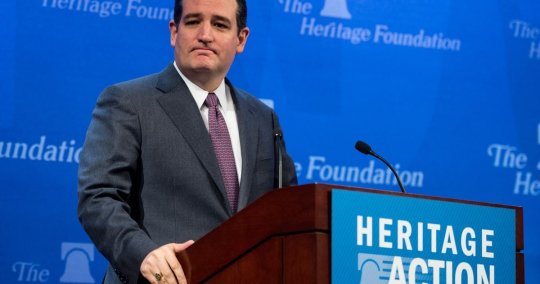
Why So Many Republicans Cling To Trump
Saagar Enjeti: Trump, GOP, On Wrong Side Of EVERYTHING Since Coronavirus Began
Ben Shapiro got part of it right. A toxic mix of status anxiety, persecution fears, and echoes of the Civil War helps explain why they follow Trump into the abyss.
On September 17, 1862, over 10,000 Confederate soldiers were killed, wounded, or went missing in a single day at the Battle of Antietam. Very few of them came from slave-owning families, so why did they agree to give their lives in defense of human bondage?
I was reminded of this question when I noticed that Politico Playbook had recruited conservative celebrity and author Ben Shapiro;to explain why the vast majority of House Republicans voted not to impeach President Trump on Wednesday for sending a murderous mob after them on January 6. Politico was slammed by liberals for opening its best-known section to a conservative whos been charged with being bigoted and intolerant. But Shapiros explanation of the rallying around Trump during his final days wasnt totally off base. He was on to something about how Republicans see the world.
With Trump leaving office within a week, defending his incitement of an insurrection doesnt seem to be in the long-term self-interest of Republican officeholders.;But the Civil War example helps explain why people sometimes do very self-destructive things out of spite or insecurity.
White supremacy was such a consensus view at the time that Lincoln felt compelled to defend it.
Like the rebels at Antietam, no one wants to die for nothing.
Support Nonprofit Journalism
Why Are Republicans So Mean
Let’s state right off-the-bat that conservatives indeed have much to offer. In fact, the very notion of conservatism itself keeps us grounded in tradition and prevents our society from spinning into the chaos of constant flux that would surely result if we were to impetuously pursue every new liberal idea to spring forth from our fertile minds. And conservatives admirably believe in America, established order, family, freedom, and success. This all sounds wonderful.
But when it comes to other people who happen to be different from the establishment, Republicans seem to be downright mean and nasty.
We are constantly reminded of the meanness of Republicans over and over again. One recent example is evident in the xenophobic remarks of the Republican presidential candidate, Donald Trump, who recently referred to Mexican and other immigrants as rapists and murderers.
Basic common sense, however, tells us that human beings are not any more or less violent based upon where on a map they happened to have been born. And the evidence in studies bears this out as well by indicating that immigrants are no more likely to be violent than members of the overall population. Makes sense.
But Republicans seem to harbor some sort of a fear of foreigners and an aversion against other kinds of people who are not part of the established in-group. Their view seems to be that these other people are not like us, they pose a threat to us , and thus automatically they should be regarded as enemies.
There Arent Real Forces Within The Gop Leading Change
There is some appetite for change within the GOP. In those 2024 polls, at least a third of Republicans either were supporting a GOP presidential candidate other than Trump or were undecided.;
In YouGov Blues polling, only about 40 percent of Republicans identified themselves as Trump Republicans. A recent survey from Fabrizio, Lee and Associates, a GOP-leaning firm that worked on Trumps presidential campaigns, found that about 40 percent of Republican voters didnt want Trump to continue to be a leader in the party. Those numbers dont necessarily mean that those voters want the GOP to change drastically. But there is a substantial number of Trump-skeptical/ready-to-move-on-from-Trump Republican voters. But that sentiment isnt really showing up in the Republican Partys actions during the last three months basically everything GOP officials in states and in Washington are doing lines up with the Trumpian approach. So what gives?;
related:Why The Recent Violence Against Asian Americans May Solidify Their Support Of Democrats Read more. »
It is hard to see Republicans changing course, even if a meaningful minority of voters in the party wants changes, without some elite institutions and powerful people in the party pushing a new vision. And its hard to see real anti-Trumpism forces emerging in the GOP right now.;
Don’t Miss: Republican Flag Pins
Reality Check : Biden Cant Be Fdr
Theres no question that Biden is swinging for the fences. Beyond the emerging bipartisan infrastructure bill, he has proposed a far-reaching series of programs that would collectively move the United States several steps closer to the kind of social democracy prevalent in most industrialized nations: free community college, big support for childcare and homebound seniors, a sharp increase in Medicaid, more people eligible for Medicare, a reinvigorated labor movement. It is why 100 days into the administration, NPR was asking a commonly heard question: Can Biden Join FDR and LBJ In The Democratic Party’s Pantheon?
But the FDR and LBJ examples show conclusively why visions of a transformational Biden agenda are so hard to turn into reality. In 1933, FDR had won a huge popular and electoral landslide, after which he had a three-to-one Democratic majority in the House and a 59-vote majority in the Senate. Similarly, LBJ in 1964 had won a massive popular and electoral vote landslide, along with a Senate with 69 Democrats and a House with 295. Last November, on the other hand, only 42,000 votes in three key states kept Trump from winning re-election. Democrats losses in the House whittled their margin down to mid-single digits. The Senate is 50-50.
Most Republicans Said That President Obama Should Be Impeached Because Of The 2012 Attack On The Us Consulate In Benghazi


Their own investigations, however, proved them wrong. Every Congressional inquiry, including those by the Republican-led House Intelligence Committee, concluded that the Obama administration did nothing wrong regarding Benghazi, that there was no stand down order given, and that neither the President nor anyone in his administration lied about it. Each and every Republican investigation has reached this same conclusion, but Republicans continue to exploit this tragedy for political gain.
You May Like: How Long Has Trump Been In Politics
Nominating Mitt Romney For President
Despite the failure to grab the Senate, the GOP was still riding strong anti-Obamacare sentiment and voter frustration over the slow recovery from the Great Recession. Much of this was fueled by the Tea Party movement, which added a rare Republican grassroots element to the GOP.
When you think about it now, all of that made former Mitt Romney an extremely odd choice for the Republican nomination for president in 2012. He embodied the establishment GOP in almost every way. Romney had years as a hedge fund manager at Bain Capital on his resume at a time when most Americans were still blaming Wall Street for the nation’s economic woes. Worst of all, his universal health coverage plan enacted while he was governor of Massachusetts looked eerily like Obamacare. In fact, “Romneycare” was seen as one of the models the crafters of the Affordable Care Act used when they wrote the law. If the GOP wanted to put up a candidate who invigorated its anti-Obamacare and increasingly anti-establishment base, they couldn’t have missed the mark much more than they did with Mitt Romney.
Bidens Bill Is More Popular
We live in the middle of an era of tremendous polarization, yet Joe Bidens American Rescue Plan is shockingly popular. Its one of the most popular, least polarizing pieces of legislation in recent memory. According to a recent Politico/Morning Consultpoll, 76 percent of voters support Bidens plan, including a majority of Republicans.
Its worth noting that most polls show that 70 percent or so of Republicans believe Joe Biden is an illegitimate president. Therefore, a large segment of people who think Biden stole the election also supports his COVID and economic recovery plans.
Obamas Recovery Act was never this popular. A January 2009 Gallup poll found that the public favored Obamas plan 52 percent to 38 percent.
These are good numbers but nowhere near the sky-high popularity of the Biden plan. At the time of this poll, Obamas approval rating was hovering around 70 percent. Bidens plan is more popular than he is Bidens job approval is 52.8 per FiveThirtyEight. That disparity is evidence of Bidens COVID plan’s political durability and the dangerous game Republicans are playing by opposing it. People who dont like Biden but like his plan are the exact people who the Republicans need to win over to take back Congress.
Read Also: How Many States Are Controlled By Republicans
Times Republicans Were Wrong
It’s no secret that politicians tend to use exaggerated political rhetoric to get people to vote for them. In recent decades, Republicans have repeatedly made very ominous predictions about the horrors that will result from Democratic policies while painting a rosy picture of what will result from Republican policies. Now we have the luxury of looking back over the years to examine those predictions and policies. Below, you will find twenty-one examples of times Republicans were blatantly wrong.
Taking The Perspective Of Others Proved To Be Really Hard
Why both Democrats and Republicans are wrong on inflation
The divide in the United States is wide, and one indication of that is how difficult our question proved for many thoughtful citizens. A 77-year-old Republican woman from Pennsylvania was typical of the voters who struggled with this question, telling us, This is really hard for me to even try to think like a devilcrat!, I am sorry but I in all honesty cannot answer this question. I cannot even wrap my mind around any reason they would be good for this country.
Similarly, a 53-year-old Republican from Virginia said, I honestly cannot even pretend to be a Democrat and try to come up with anything positive at all, but, I guess they would vote Democrat because they are illegal immigrants and they are promised many benefits to voting for that party. Also, just to follow what others are doing. And third would be just because they hate Trump so much. The picture she paints of the typical Democratic voter being an immigrant, who goes along with their party or simply hates Trump will seem like a strange caricature to most Democratic voters. But her answer seems to lack the animus of many.;;
Democrats struggled just as much as Republicans. A 33-year-old woman from California told said, i really am going to have a hard time doing this but then offered that Republicans are morally right as in values, going to protect us from terrorest and immigrants, going to create jobs.
Don’t Miss: What Color Ties Do Republicans Wear
Reality Check #: The Electoral College And The Senate Are Profoundly Undemocraticand Were Stuck With Them
Because the Constitution set up a state-by-state system for picking presidents, the massive Democratic majorities we now see in California and New York often mislead us about the partys national electoral prospects. In 2016, Hillary Clintons 3-million-vote plurality came entirely from California. In 2020, Bidens 7-million-vote edge came entirely from California and New York. These are largely what election experts call wasted votesDemocratic votes that dont, ultimately, help the Democrat to win. That imbalance explains why Trump won the Electoral College in 2016 and came within a handful of votes in three states from doing the same last November, despite his decisive popular-vote losses.
The response from aggrieved Democrats? Abolish the Electoral College! In practice, theyd need to get two-thirds of the House and Senate, and three-fourths of the state legislatures, to ditch the process that gives Republicans their only plausible chance these days to win the White House. Shortly after the 2016 election, Gallup found that Republican support for abolishing the electoral college had dropped to 19 percent. The National Popular Vote Interstate Compact, a state-by-state scheme to effectively abolish the Electoral College without changing the Constitution, hasnt seen support from a single red or purple state.
Surrendering Before The Battle
The midterm elections of 2014 gave the Republicans control of the Senate that they should have won in 2010. But even before the new members took their oaths of office, then-Senate Majority Leader-elect Mitch McConnell promised never to trigger a government shutdown. That effectively took the sharpest arrow out of the GOP’s congressional quiver, and again relieved the greatest pressure the Republicans could have exercised against Obama.
Don’t Miss: Did Donald Trump Say Republicans Are The Dumbest Group Of Voters
Unified Republican Opposition To Obama’s Policies Helped Them Retake Congress In 2010 Here’s Why It May Not Work Again
When the House of Representatives passed President Bidens COVID-relief plan last weekend, every single Republican voted against it. Earlier this week, Senator John Thune, Mitch McConnells deputy, predicted that every Republican Senator would vote against the Biden plan. Thunes reasoning was typically cynical. He said the Republicans wanted to:
make the Democrats own a piece of legislation that I think is going to have long-term adverse consequences.
This was the latest example of Republicans saying the quiet part out loud. Thune is admitting they are making a bet that the Biden plan wont work, and Republicans can reap the political rewards of a sub-standard economy in 2022. This is the same bet the Republicans made in 2009 when they decided to oppose Barack Obamas efforts to address the financial crisis.
Politically, the 2009 bet paid off. The Republicans rode a wave of economic discontent to control of the House and a massive set of wins down-ballot that would impact politics for more than a decade. But just because it worked then doesnt mean it will work now. The Republicans may be making a massive miscalculation by re-fighting the last war.
Republicans Said President Obama Would Raise Taxes Sky High

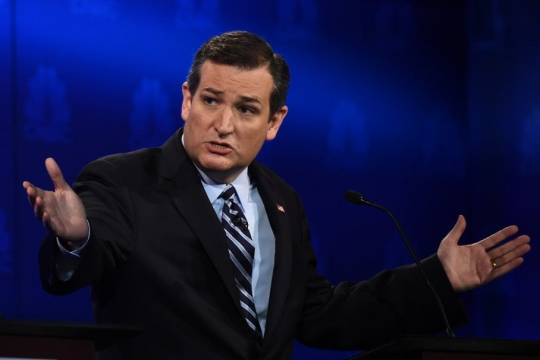
It never happened. Income taxes for over 95% of Americans remained the same or lower than they were before Obama was elected. The only people whose income taxes increased were those who make more than $400,000 per year, and their taxes rose only 3%. For most Americans, taxes are still lower now than they were under Reagan.
Read Also: Trump Quote In People Magazine 1998
Blowing The Midterm Elections
The 2008 elections gave Barack Obama a clear win in the presidential election and the Democrats a filibuster-proof supermajority in Congress. They proceeded to spend that political capital almost entirely on passing Obamacare in a lengthy process that included a number of unusual compromises with their own party members, like the “Cornhusker Kickback” and controversial legislative tricks like the “deemed as passed” maneuver. All of this took place even as the Affordable Care Act failed to gain majority support in the polls.
That set the stage for a strong Republican advantage going into the 2010 midterm elections. On paper, the GOP did score a resounding victory, picking up 63 seats in the House of Representatives and a net gain of six seats in the Senate.
But Republicans blew a solid chance to retake the Senate. They put up weak candidates in several winnable races. They included Sharon Angle in Nevada, who was seen as too radical and managed to lose to then-incumbent Harry Reid despite his very weak approval ratings in his home state. Arch-abortion opponent Ken Buck won the GOP nomination in Colorado, . The biggest mistake of all was Christine O’Donnell in Delaware. O’Donnell lost after she became infamous for her revelation that she had once experimented with witchcraft.
As a result, the Democrats kept control of the Senate and the Republicans lost a chance to force Obama into what could have been a series of advantageous compromises over the next six years.
The Gop Is A Grave Threat To American Democracy
Unless and until Republicans summon the wit and the will to salvage the party, ruin will follow.
About the author: Peter Wehner is a contributing writer at The Atlantic and a senior fellow at the Ethics and Public Policy Center. He writes widely on political, cultural, religious, and national-security issues, and he is the author of The Death of Politics: How to Heal Our Frayed Republic After Trump.
The hope of many conservative critics of Donald Trump was that soon after his defeat, and especially in the aftermath of the January 6 insurrection, the Republican Party would snap back into its former shape. The Trump presidency would end up being no more than an ugly parenthesis. The GOP would distance itself from Trump and Trumpism, and become a normal party once again.
But that dream soon died. The Trump presidency might have been the first act in a longer and even darker political drama, in which the Republican Party is becoming more radicalized. How long this will last is an open question; whether it is happening is not.
To better grasp whats happening among 2020 Trump voters, I spoke with Sarah Longwell, a lifelong conservative and political strategist who is now the publisher of The Bulwark, a news and opinion website that is home to anti-Trump conservatives. She is also the founder of Republican Voters Against Trump, now the Republican Accountability Project.
Recommended Reading: Donald Trump People Magazine Article 1998
Prior To Going To War In Iraq Defense Secretary Donald Rumsfeld Optimistically Predicted The Iraq War Might Last Six Days Six Weeks I Doubt Six Months
What’s more, Vice-President Dick Cheney said we would be greeted as liberators by the Iraqi people after we overthrow Saddam.
They were both horribly wrong. Instead of six weeks or six months, the Iraq war lasted eight long and bloody years costing thousands of American lives. It led to an Iraqi civil war between the Sunnis and the Shiites that took hundreds of thousands of Iraqi lives. Many Iraqi militia groups were formed to fight against the U.S. forces that occupied Iraq. Whats more, Al Qaeda, which did not exist in Iraq before the war, used the turmoil in Iraq to establish a new foothold in that country.
The Iraq war was arguably the most tragic foreign policy blunder in US history.
0 notes
Text
A lot of discussions about the history of labor in the US and to some extent Canada leaves out a lot of contribution from the aapi work force, especially coolies. A lot of concessions we now see were hard won by the aapi work force, predominantly Chinese and Filipino.
White people claim victories that belong with the AAPI work force. This erasure also makes people constantly ask why do we have these chinatowns or japantowns or koreatowns in certain areas. Why do so many asian folks have grocery stores or laundry mats or restaurants? Because they were not desirable or allowed other work after leaving the plantations and dams and railroad tracks they had built sometimes literally from the ground up. Or the trade in sea food that we now see going backwards where proper labor laws are concerned. There is an entire period of asian workers fighting long and hard for respect and justice from various fisheries. But they are often left out, in a bitter irony.
The image of the asian office worker, quietly toiling away at their computer or going over finance in neatly pressed clothes and never speaking up about long hours and lack of respect, feeds into the model minority myth and ignores how few asians are actually in middle management or lower and even fewer in the upper echelons. To say nothing of the stereotypes and racism regarding the taxi service or convenience stores, aimed at the south asians.
Thousands of asian men were shipped over to the US in conditions that saw a shockingly high morality rate. And they went alone. Often they were lied to about wages and everything else that would be part of their new life across the ocean. For years they might not see their families. They were slaves in all but name. If they wanted their families, a ridiculous amount of money had to be paid. And once their families got here they were subjected to interrogation at Angel Island and often forced into cramped barracks for weeks or even months. One man infamously was kept on Angel for 2 years.
In Canada, a head tax was applied to stem the "tide" of Asian immigration. It started at $50 then went up to $300 then eventually $500. The only upside is this drove up wages for Chinese laborers, as they were in short supply but high demand.
The Chinese Exclusion act was not just a US thing. Canada enacted one too after watching the US and how well it worked, albeit a number of years after. The song ‘White Canada Forever’ gives a pretty good idea of Canadian thoughts on the Asian immigration, specifically mentioning they are ‘defending Canada’ against the ‘Oriental group’.
Down in Mexico, the same issues with chinese immigration as they started heading south when they were blocked from the US and Canada. Antichinistas appeared almost at the exact same time wherever the Chinese went even if they were very few in number. Some of the Chinese had moved south to follow the American businesses that went there for mining and railroad building, and once those were done again they had to find a new line of work as they didn't wish to go back North where things were worse for the Chinese. But then, eventually things were as bad south as north, with a number of riots, raids, and lynchings about and of Chinese of all ages and genders. As north, so south. The massacre of Torreon in particular is noteworthy as it literally removed half of the number of Chinese, 303 out of only 600 to 700. On top of that, Chinese businesses were in ruins with damages upwards of $850,000.
In 1922, all Chinese had to register and identify themselves to the Mexican govt. In 1923, they were to be segregated and it was made illegal for interracial relation of any kind. By the 1930s, a large number of western countries had modeled their immigration laws after the US and Canada. In 1931, legislature was passed that required 80% of employees of any and all foreign owned businesses be Mexican.
The Japanese were "next". Although they immigrated around the same time as the Chinese, the response was slightly stilted in response to fears of how much stronger Japan seemed than China. Germany, strangely, helped set off the anti Japanese sentiment with Kaiser Wilhelm commissioning a painting that showed the western countries banding together (painted as women warriors) to defend against the "yellow invasion force", coining the term "yellow peril", shown as Buddha riding a Chinese dragon.
Exclusion was repealed in 1943 BUT there were still racial barriers that didn’t go down until 1952 followed by the abolishing of the National Origins Formula, which dictated how many of each nationality was allowed at maximum based on various proportions and quotas (starting in 1921), in 1965. People act like it was forever ago and it wasn’t. This sadly isn’t even getting into the waves of refugees from the various world wars and country specific wars that saw Vietnamese, Koreans, Cambodians, and more crossing the Pacific to arrive on American and Canadian shores.
Japanese and Korean Exclusion Leagues ended up quickly changing their names to simply ‘Asiatic Exclusion League’ as more and more nationalities moved to the Americas. These exclusion leagues would claim to keep Canada and the US white and ‘no cheap Asiatic labor!” All of this of course ignoring that the North Americas had men bringing asians over for work. On things that those same asians would be banned from enjoying and taunted over building.
Remember the coolies. Remember how asian businesses in the US got started and why. Remember why chinatowns and japantowns and the like sprang up in areas that seem a little odd. All because North Americans wanted cheap and plentiful labor. While at the same time booing the very idea and getting hysterical over the number of asian immigrants arriving.
0 notes
Note
So, what is the deal with tumblr's weird beef with Pixar's new movie Coco? I see a lot of people complaining about it and I don't get why
That’s actually a really interesting subject, because there’s quite a lot to unpack there:
1: Earlier into the films production, Disney tried to trademark the phrase “Dia de los muertos”, the Mexican name for the Day of the Dead holiday that the movie is based around. Naturally this resulted in justifiable outrage and disgust from Mexican citizens and fans at a company trying to trademark a holiday that holds great significance to their culture. Thankfully Disney quickly backed down after realizing how stupid they had been, but it still left many people bitter and weary of how the movie was going to turn out.
2: You heard of The Book of Life? It’s another movie based around the same holiday released about three years ago. It was generally well received by critics, but had something of a broken base reception among audiences for a variety of reasons, and made just shy of $100 million at the worldwide box office on a $50 million budget, making it only a very modest success at best. Though it has a passionate fandom especially here on tumblr.
Part of that has to do with the fact that it was directed by Jorge Gutierrez, a talented Mexican director and animator probably best known for creating the Nickelodeon show El Tigre. He’s a nice guy from what I’ve seen and very passionate about his culture and his works.
Tumblr and many social justice advocates are very passionate about pushing for a wider range of diversity in the media, and that includes behind the scenes and supporting the work of minority creators in Hollywood and the entertainment Industry in general (And understandably, it is an important cause).
So when Pixar announced the release date for a film also based on the Day of the Dead holiday, directed by a white man, fans of The Book of Life and Jorge became immediately salty over the prospect, since with Pixar’s pedigree even if the movie turned out not well received it was all but guaranteed to make WAY more money and get far more publicity from both the general public and the animation community than the Book of Life did, maybe even having a shot at winning best animated feature Oscar due to the academy’s bias towards Disney and Pixar due to their general disregard to animation as a legitimate art form worthy of their attention.
3: Disney have a very shaky history with representing non-white groups of people and cultures, many of their classic and even recent movies featuring offensive stereotypes or just downright racist stories, the most well known example being Pocahontas, a movie where if you know anything at all about the real life person it’s story is “Based” on, you’d… be pretty insulted, to say the least.
They’ve gotten better at this to an extent this century, Moana for example despite some complaints was pretty well researched and the filmmakers clearly cared about doing their best to respect Polynesian culture. But a lot of people are just suspicious whenever Disney release a work vaguely like Coco made by a white director and mostly white crew. The fact that it’s specifically Pixar making the film doesn’t alleviate this sentiment, since they’re owned by and heavily connected to Disney.
This also ties in with the previous point, where Book of Life fans and people who want to see more support for movies about Mexico and their culture by actual Mexican creators feel embittered about the situation with Coco, to the point of calling it a rip-off based on any even coincidental similarity they perceive between the two films.
Disney did recognise this, and brought on a Latino co-director in Adrian Molina, and a number of high profile Latino consultants including the CEO of the Mexico Heritage Corp Marcela Davison Aviles to help make sure the film was as accurate and respectful to Mexican culture and the traditions behind the Day of the Dead holiday as possible, the director and crew already having done extensive research to have achieved this from the start of production.
This helped alleviate some people’s concerns, but for many the damage was already done and among many here on Tumblr there was lingering resentment both from Book of Life fans and many people who just felt that a film about Mexican culture should have been the work of Mexican creators from the start. So the movie had a hard time winning over much of it’s detractors pre-release.
And, while I think there’s more I could add and probably I don’t know about, I think that covers a lot of the main points.
From what I’ve seen, Coco has been unanimously well received in Mexico upon release, and despite the attitudes of his fans Jorge Gutierrez loved the movie, and was very excited about having multiple animated movies about an important holiday from his culture being made (A sentiment echoed by many Mexican people and fans as to why the complaints about being a rip-off of Book of Life just from being based around the same holiday were unfair and jumping the gun, since how many movies do we have about Christmas and Halloween?).
So, it looks like things turned out fine regardless of the controversy. Now, I haven’t seen the movie. And I’ll say upfront, I’m a white-British guy who only has a basic knowledge about Mexico and it’s culture. I can’t tell you how accurate and respectful the movie is, whether it features any problematic elements or stereotypes and any of that. I probably wouldn’t be qualified to comment on that even after watching the film.
If there are Latino fans who have watched the movie, and are very passionate about their culture and how their people are represented in the media and they take issue with anything in the final product, I won’t argue too hard with them.
I will say though that a movie like this being made, and the way it’s been embraced by the people it’s representing, is a very important thing for Mexican people. We need more movies based on and which lovingly embrace and celebrate that country and it’s culture, now more than ever maybe with the rising anti-immigrant and anti-Latino sentiments in the United States, especially with President Crazy Steve and his “Let’s build a wall to keep those rapists out of our country and save our jerbs!!” nonsense.
It’s important for non-Latino children to see movies portraying Mexico and it’s people in a positive way, and maybe even more so important for Latino children to see themselves in the media as the heroes more often than they do currently, especially those of immigrant families.
So, with the film now released and the very positive reception it’s got, you know… maybe we can all just calm down a little and accept this as a victory?
45 notes
·
View notes
Text
Remember The Titans and Black Lives Matter
I learned American History from Hollywood films and pop culture during the Bush Administration.
My 6th grade teacher was horrified to see my potential wasting away on the frivolity of Based on True Event sport blockbusters and Remakes of Dystopian Nightmares, Sarcastic Teeny Bop Melodramas.
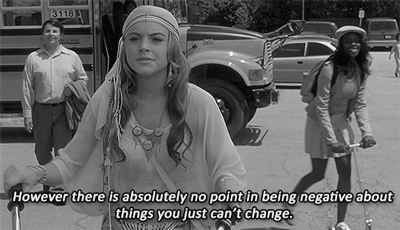
Or, worse, the Hippy Dippy Nonsense genres that encouraged the youth to remain ignorant Sheeple With A Death Wish like Jackass or Gossip Girl
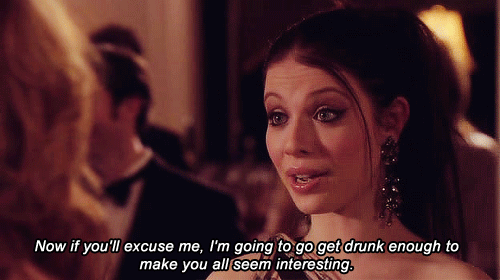
Despite how that sounds, he wasn’t a condescending prick. He was a good man with very high standards for media that he came off as a snob. Because he was. A snob. With so much nerd rage. That’s what made us bond.
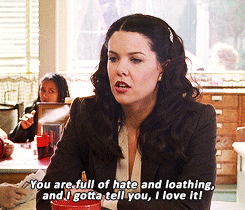
You see, I’m a snob too. I had to be. I am the daughter of immigrants. And I grew up during the Bush Administration.

I grew up during a time of Prop 187, El Nino, El Morro, Thalia Y Tomy Motola y el secuestro, Pasale Paisano, anti-Cuba sentiment, Fake News, Columbine, Hanging Chads, 9/11/01, Pseudo-Fascism, WMDs, Jingoism, Patriot Acts, They’re Gonna Follow Us Home, Shakira, Katrina, George W Bush Hates White People Kanye Scandal, Militia, NRA Guantanamo, Dixie Chicks, A Day Without A Mexican, Selena the Movie, El CHupacabra, End of the American Dream, Once In A Lifetime Breaking News TRL Britney Once In A Lifetime Civil Unrest Breaking News Breaking News Narco Corridos Breaking News Miramax Breaking News Anthrax Breaking News Marylin Manson, Las Hijas De Juarez, Eugenio Derbez, La Escuelita, Los Tigeres Del Norte, Los Tucanes De Tijuana, Napster, Metallica Some Kind of Monster, Bono, Apple, Pixar, MySpace, AIM, new tech every 6 months, cell phones, Reggeaton, Walter Mercado Primer Impacto, American Idol,
To boot, I am the daughter of immigrants. Who were hyper-Catholic. And narcissists. And abusive. And alcoholics. Who were allergic to stability, progress, open-mindedness, or anything conducive to raising children in a global crisis.
So I had to be selective about the media that I consumed. Because my mother was a Batman Villain, my paternal-figure was a reluctant father unwilling to abandon his fuckboi ways for his family, and my brother and I were left to our own devices to figure out how to raise ourselves and our parents. We sucked at it. And years later we are paying for trying.
So, while navigating the highs and lows of our own puberty-induced hormonal roller coaster, we had to think quick and raise our 2nd-adolescence shit show of a parental unit.
We were parentalized. I didn’t know it at the time, but that is what happened to us.
What I did know at the time is that I needed to figure out how to live. Come up with a division of labor within the family unit and ensure that everyone played their role. You know, like the mother typically does.
And in order to play my role, I had to be studious of this different culture. Not just American culture. Not just teen culture. Not just Mexican culture. But all of them. Somehow, I had to find a way to navigate life. Since the age of 9 years old.
It’s exhausting having to be the adult of the house. I did not have a chance to be a child. Or matter to anyone. So I learned to matter to myself.
I learned not to trust anyone to be part of my support system because the people who were supposed to show me what that looked like were emotionally unavailable. And they stubbornly refused to divorce because that would mean they had failed their culture and religion and would be ostracized from the communities made of individuals they hated but stubbornly worked to impress and fit into.
And that meant that I befriended a strange array of really awesome people who made me feel seen and heard and understood. Like this Santa Clause-looking white dude with a motorcycle fetish and a kind touch with prepubescent girls with culture shock and daddy issues. Best of all, he was genuine. And sweet. And not at all inappropriate with children. That’s not sarcasm. He was not inappropriate with me or anyone else that I knew of. He truly was a great teacher.
Which is why I tried to keep in touch with him long after 6th grade. He was a computer nerd and introduced me to the wonder of the internet. And internet humor. And being opinionated. He was my Big Guy Bow Tie.

His opinion meant so much to me and I wanted to please him so badly.

And not once did he cross a line that would make it harder for me to thrive and move past the other trauma I was being exposed to.
How sad that I feel compelled to reiterated that he never diddled me. Sad for his reputation and sad that I have come to terms with how vulnerable I was to predators.

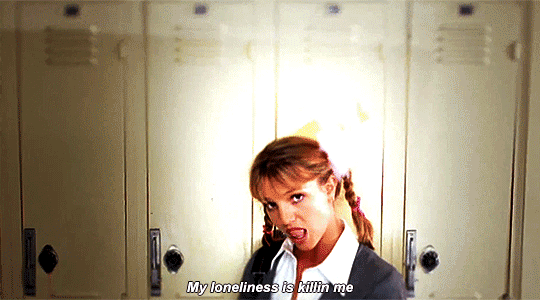
He was a real one.

I knew that my feelings were not normal in the broader sense of the word. But I understood that it was all I had to work with and make magic with it. So I figured out that I would have to be very guarded and selective with my time, effort, and social circle. Which often meant I was the smart young adult in a group of what I thought were sophisticated adults but were really ghost of my future if I did not get past my daddy issues in a healthy way.
By the time I got to high school, I was the weird kid

I had no idea how I got there. But I had to figure out how to follow my passion without wasting my potential.

My passion is art. Specifically, music. But in general? Art. Books, Poetry. Knowledge.

And because that wasn’t complicated enough: I was discovering my own sexuality.

And the first born first generation Mexican American with hyper Catholic parents.
I may as well have come out as a supporter of the Axis of Evil

They would never understand that I was ACTUALLY part of the Axis of Awesome

They would not understand. It would be lost in translation

So I had to learn to be silent with my truth. Forever hiding in the shadows and wondering when my life might begin



It began when I learned that the library was my escape. That I could learn about anything I wanted with very basic tools and that my ingenuity would get me far

But what does any of this have to do with Remember The Titans? Or Black Lives Matter?
Well... everything.
Because in addition to my parents being old fashioned and abusive, they were also closet racists. I had to teach myself not to ingrain their prejudices as I trusted them to keep me alive. I had to walk a very fine line between Daddy’s Girl and Daddy Issues. A fine line between Mommy’s Little Princess and Mother Knows Best and No The Fuck You Don’t.
And I managed to do that with the renaissance of black content creators in the early 2000s. Remember the Titans was a favorite of mine.
Little did I know

I was teaching myself to experience different cultures without appropriating them. I found what I was into and I immersed myself in it.

But I hid it. I silenced my opinions and tried to keep the peace. For the sake of my family.
That did not work. Shocking.

But I was left with the realization that even though my effort was wasted with my nuclear war of a family, I learned valuable lessons that I taught myself. Including that Black Lives Matter, anyone who has trouble acknowledging that needs to grow the fuck up and learn something cause we’re running out of time and ain’t nobody got time for ignorance an fear with a mad man in the white house.

And I don’t want to miss out on my life simply because I come from dysfunction and am constantly playing catch-up to understand what normal is and how to achieve it
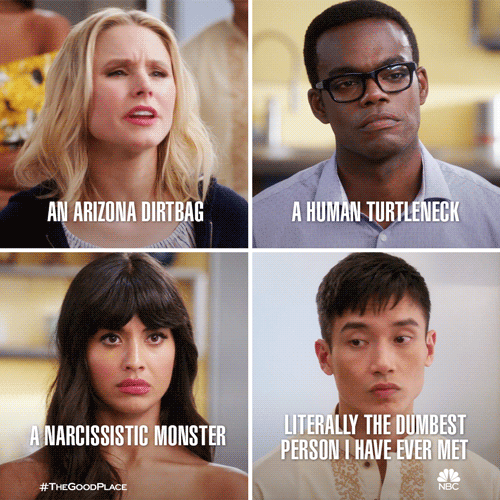
I am not alone in this. I come from a generation of American children who learned to cope with complex issues of race, politics, satire, drugs, over-medication. self-medication, financial irresponsibility, weaponized faith and ignorance. It was the dawn of the age of the Basket of Deplorables. And Millenials were caught in the crossfire. I was caught. And I learned. Black. Lives. Matter. Women have voices and opinions that matter and a feminine point of view is crucial to the success of any business endeavor. I taught myself feminism and committed to its intersectionality before I knew it may be a word the dictionary I owned was missing. I learned that words matter because language has power. I tasted the crispness of that juicy apple from the tree of knowledge. And I wanted to marinate in its juices until i was good and goddamn ready to be tasted and known myself.
Oh yeah, I learned my Daddy Issues manifest themselves in a need to sexually please emotionally unavailable men.

So I chose as wisely as I could. You know, what with the inmates running the asylum
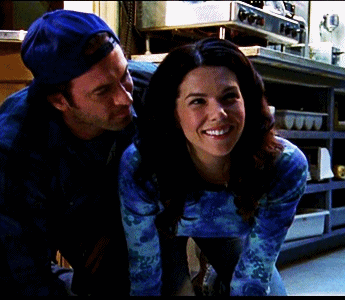
But my god am I into drummers! And linebackers! And Cheating Ass Marine Motherfuckers With Secret Families in Portland who Ghost a Bitch Just When She’s About to Fall!!!

My picker is off. I learned that phrase from Loveline. Another resource in my quest to exist in my natural state

Having to twist myself into a pretzel to please the un-pleasable was unsuccessful.

So I stopped and focused on my real family. My chosen family. Those who care if I live, die, have food and rent money, and ask me to text them when I get home so they know I am safe. Those people. My people. I go hard for them. And they are various heights, weight-classes, political affiliations, complexions. because I learned that black lives matter. As well as Asian American Lives. And Migrant Lives. And Femme Lives. And LGBTQIA+ Lives. In essence, ALL LIVES MATTER INCLUDING BLACK LIVES. Because life is too hard in it’s natural state to be excluding people from We The People. Because the America I Still Believe in does not allow for any of this maga shit to stand

Because we need to be allies for each other against the real danger to this country.
Internalized Systemic Racism and how it has been exploited to separate the working classes in a strict divide down socio-economic boundaries that are not easily crossable. This phenomenon is often called a glass ceiling. Minorities are particularly affected. But that doesn’t mean that all white people are to blame or responsible or immune. You see, I’ve read the Handmaid’s Tale.

And while everyone is looking at the Scarlet Robe of the Handmaids and the Serene Teal of the Wives, no one looks at the EconoWives. Wife Trash, I suppose.
Much like the Titans’ football season. High school seniors in a recently-desegregated town. Sounds like the plot of a Disney movie or a Based On True Events TV movie
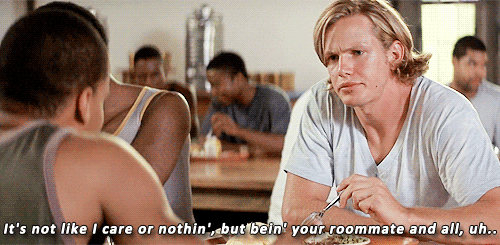
Gee... I can’t imagine why I related to this...
But I did and I learned from it. I learned that it takes effort to make a champion. And it is not accomplished alone. And while the odds may be ever against you
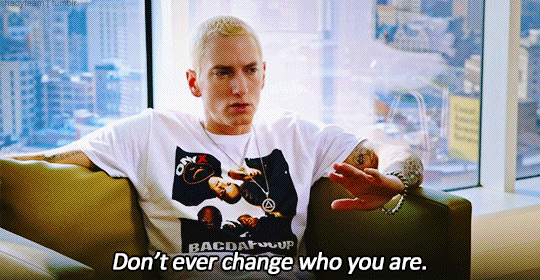
You have to decide what matters to you. And if that is football, you listen to your brothers on the team and keep your circle small.
And if that is closet-cases that fear for their safety when outed

And if that is a mother at 9 years old because that is how old you were when you realized you were more emotionally intelligent than your own pathetic excuse for a mother who is really a batman villain who you will later turn into if you don’t watch out for the stalker tendencies now and your fuckboi father who still cheats on your mother because this is a pity marriage that neither of them are ready to end even though everyone would be better off, especially your brother who is a precious little squish but being psychologically handicapped by the Stephen King Novel raising him and who is so much like you but you won’t know that for several years because you’re just a child and what do you know what normal is or is not supposed to feel like...


Then that’s just what the fuck it means.
My therapist asked me how I’m doing in 2020 with my depression and the isolation and what I think about the protests.
Like if the logic behind the protests was up for debate. Or if it was a political statement rather than a statement of human compassion and empathy to say that
Black
Lives
Matter.
I guess she hasn’t seen Remember the Titans
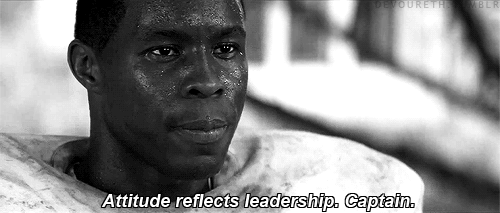
0 notes
Text
The paranoid style is back, and better than ever
I know I’ve said this ad nauseam in these pages, but oh man are we in trouble as a nation. We find ourselves today in such an extremely ugly place, in the post-Obama era—an era riddled with hysteria, paranoia, division, hatred, extremism disguised as normal discourse. In fact, thanks to Fox news and the public institutions of hysteria (Rush Limbaugh, et al) much of what once might have been considered radical, violent, extreme or just plain socially unacceptable views or behavior is now normalized across the airwaves on a daily basis. It’s mainstream!
This trend has been exasperated by the anonymity and free expression (or rather “free of consequence” expression) allowed by the internet that leads us deeper off the cliff. Thus, here we are now, in the throws of the golden age of paranoia—a deeply shameful and disgusting time in America. Hallelujah!
So I figured this is the perfect time to go back and reread the original article “The Paranoid Style” by Richard Hofstadter (from Harper’s Magazine, 1964) which put into writing, clearly and thoughtfully for the thinking world to see a phenomenon that’s plagued the human race for centuries.
Hofstadter writes about popular movements in American history fed by conspiracy theories, and politicians who used those conspiracies to manipulate and stimulate voters’ passions. The anti-freemason movement of the late eighteenth century; the anti-catholic movement of the mid-nineteenth; the ani-shadow banker movement of the early 20th century; and of course, everyone’s favorite anti-communist frenzy of the McCarthy era. He ends on, what was then, the current rage in Paranoid Politics: the Barry Goldwater campaign, in which many of the pillars of modern conservative conspiracies were born and cemented.
But one thing I can’t help in reading about all these great moments in paranoid politics, is how quaint they are. How simple and relatively innocuous.
Hofstadter writes that one of the noteworthy developments to occur in the “modern” Goldwater era was the infusion of mass media to help fuel whatever strange and depraved messages were being brokered. Oh, but how gentle and dated the Goldwater days seem now, in comparison to today’s white hot mess. If Goldwater only had access to forces like Fox news and the internet, there’s no telling how far he could have gone. But he didn’t.
Rereading about the basic tenants of the paranoid mind and the exploitation thereof, it puts much clarity on what is happening to us now in this moment, and on how it is happening. The fears, the types of conspiracies, the invented enemies that politicians and media personalities use to manipulate voters, they come from well worn places in the human (or at least, the American white male) psyche. Capitalism is being undermined! Infiltrators from “outside” have worked their way to the highest levels of government. Backed by, and in cahoots with international radicals and powerful shadowy figureheads, they are plotting the destruction of the United States.
By the way, here’s an exercise for you: watch Fox news tonight and count how many times the say the word “socialist” in the course of a between-commercials segment. Also, how many times they pair the word “socialist” with “democrat” or “democrat party.” This is a way to get very drunk, very fast.
Even more disturbing and appalling then the actual practice is the skill with which the perpetrators of today’s paranoid politics inflict their craft. Whether it’s Trump, Sean Hannity, Laura Ingraham, or some Russian troll farm, these people know what the fuck they’re doing.
Look at the Russian trolls of 2016, for instance. They knew the exact type of conspiracy theory to publish, the exact kinds of stories that would gain traction and be share (amplified) by their intended audience: Hillary Clinton’s missing emails. Proof she was corrupted by foreign governments—a corrupt insider who’s infiltrated the highest levels of US government! Classic stuff, right out of the pages of Hofstadter.
Our current president, despite his massive faults, nastiness and moral deprivations, is an extremely gifted Paranoid politician. He has taken the art to new heights. In fact, in most instances, it’s all he’s got.
His particular gift is language. He finds perfect little packets of words to neatly summarize, encapsulate and motivate the conspiratorial spirit:
“The system is rigged”
“Fake news”
“Witch hunt”
“Giant hoax”
He repeats these over, and over, and over.
Let us not forget as well, that this guy’s entré into the world of national politics was through the “birther” movement, which itself was something of a high paranoid achievement. The president (Obama) was actually born outside the United States and is therefore not legitimate. He’s a foreigner, hell-bent on destroying democracy, capitalism and the constitution! The fact that Obama was African American worked doubly well on the paranoid mind: the theory fit so perfectly into those warped pre-conceived paranoid notions that blackness is otherness, and that those with dark skin represent a threat to the natural order of America. It was a paranoid home run, giving rise to a whole new era of mind bogglingly delusional right-wing ranting.
Cutting his teeth on this vast and rich material, the current office holder of the presidency continues to use the dark sentiments of “birtherism” to his advantage. Another of his overused verbal bludgeons is to blame all negative things happening in our country on Obama. And weirdly, to justify any untoward practices he uses himself in office by claiming, mostly wrongly that “Obama did it!” There is no logic or reality to this, but to the paranoid mind, it all makes perfect sense.
Sadly, it’s this same deep paranoid fear of dark skin that gives fuel to one of the greatest national disgraces of our era: our current immigration policy and this ridiculous turmoil about “the Wall.” None of this nonsense would be possible if not for a broader fear of dark skin “infiltration” which has been building with the paranoid crowd over the last 10 years or so.
In fact, when you look at just about any of today’s most important political battles today, it seems that the obstacles to progress and sensible policy are built out of paranoid building blocks. Whether it’s immigration policies, stopping the epidemic of gun violence, curbing widespread sexual harassment, ensuring fair and equal voting practices, or just about any issue on the table, you encounter some very emotionally powerful appeals to the great, white, irrational mind.
For instance:
Immigration:
Dark skinned rapists are crossing the border, stealing our jobs!
Gun Violence:
Democrats and liberals want to take away our guns!
Institutionalized Sexual Harassment:
White men in this country are under attack. Liberals want to destroy our careers!
Voting Rights:
Black people, Mexicans and democrats are voting illegally! They’re stealing our elections!
Environmental Policy
Global warming is a Chinese hoax! Regulations are killing our jobs!
Healthcare:
They’re trying to import European-style socialism and destroy capitalism!
Religion:
Christians and christianity are under attack from atheists and democrats who want to dismantle your religious liberty.
Fair taxation:
Socialism!
The fact that these conspiratorial roadblocks have been in use for such a long time and have been set in high-repeat mode puts us in a very tricky situation.
These paranoid sentiments are no longer loony-bin, fringe and weirdo rantings. They have become a standard, acceptable form of mainstream political discourse. People are using them ad nauseam to distort and short-circuit any type of rational political debate.
The birth of a new Rational Movement in politics
Rereading Hofstadter's original article, and working through some of my thoughts have helped tremendously to give me a sense of clarity towards our current political predicament. It’s also helped to clarify some thoughts about a possible way out of this mess.
Here’s what I hope to see: some politician, or several politicians really, thought leaders, public voices, personalities, spokespeople from all walks of life and political persuasions, rising up from the current crop to begin a massive, persistent de-bunking and re-framing campaign.
They will need formidable language skills, guts, conviction, and god-like perseverance. The end goal: re-frame the debate. Shed light on the bizarre and out-of-whack nature of our current politics. Make it crystal clear what’s happening.
They cannot be the wonky, policy-minded politicians of today’s left, or the quirky, quick-witted personalities of MSNBC or late night TV. They cannot be merely smart people with good ideas. They need to convey the weight of truth and urgency in their words. They need to clarify in a concise, colloquial way. They need to lay it all on the table.
We are fighting against deep paranoid fears and the people who exploit such fear.
This is not a debate between left and right or liberalism versus conservatism. It’s a debate between sanity and insanity. Between rational thought, and bizarre ranting. It's a debate between very real ideas and irrational fear.
The Fox news crowd needs to be called out again and again, not as the “right” or the “right wing, but as the “paranoid right.” The two words can never be uncoupled.
Most importantly, politicians cannot pretend to debate against opponents who eschew this garbage. Call off the debates. Don’t yell at each other across the podium or from different boxes of the TV screen. Do not argue with insanity—it only serves to elevate it and make it seem like it’s a real, valid point-of-view.
At this point in time, I believe there is still a soft middle in the American electorate—people who have not yet been radicalized, polarized, marginalized, cannibalized or disenfranchised. People who are still open to political discourse and are still capable of making decisions based on thought and information. These are the people who need to be reached and influenced. These are the people that can save our collective hides.
Of course, a few other things need to happen. For instance, Fox news needs to be put off the air once and for all. And the internet needs to be unplugged. But those are discussions for another day.
0 notes
Text
Have Trump's Immigration Policies Made the US Safer?
In this edition of The Interview, Fair Observer talks to Hiroshi Motomura, a distinguished professor of law at the University of California, Los Angeles.
Since coming to office, President Donald Trump has tightened US immigration policies, both legal and illegal. His policies follow economic nationalism and are part of his “America First” slogan, aimed at protecting American workers and industries.
In 2017, Trump banned immigration from several Muslim-majority countries and ordered the building of a separation wall along the US border with Mexico, from which a large number of illegal immigrants flock to the United States. The Trump administration also enacted a policy that permitted the government to take thousands of illegal migrant children from their parents at US ports of entry and place them in cage-like detention centers.
On several occasions, the US president has blamed the apparently “lenient” and “generous” immigration policies of America. He has described these as the most “ridiculous” immigration laws in the world and censured immigrants for the economic and social woes the country faces.
In recent remarks, President Trump said, “Illegal immigration hurts American workers; burdens American taxpayers; and undermines public safety; and places enormous strain on local schools, hospitals, and communities in general, taking precious resources away from the poorest Americans who need them most.”
Trump's harsh crackdown on immigration seems to be a realization of his campaign trail promises from 2016. Advocates and attorneys say the restrictions are meant to upend all types of immigration, despite the country having a moral and legal obligation with regard to refugees.
In this edition of The Interview, Fair Observer talks to Hiroshi Motomura, the Susan Westerberg Prager distinguished professor of law at the University of California, Los Angeles, about Trump's contentious immigration policies and their legal implications.
The transcript has been edited for clarity.
Kourosh Ziabari: Do President Donald Trump's immigration restrictions, especially his Muslim ban enforced through the Executive Order 13769, which was superseded by the Executive Order 13780 and Presidential Proclamation 9645, have constitutional justification?
Hiroshi Motomura: The US Supreme Court decided in June 2018 that the lower court was wrong in blocking the ban from going into effect. The court's reasoning suggests that it believes that the third version of the ban, in a Presidential Proclamation, is constitutional, as justified on national security grounds and consistent with federal immigration statutes. But there is still ongoing litigation on the question whether the individual waivers - which would allow people to come to the United States in spite of the ban - are being administered in a way that is lawful.
So, the basic answer is that the ban as written has a constitutional justification, according to the Supreme Court, but that as actually implemented it may violate either the Constitution or federal statutes. We won't know the answer to this question for some time, because this aspect of the case needs to work its way through the courts.
Ziabari: Do you agree that a more reasonable approach to immigration is devising mechanisms to prevent illegal immigration and promote legal immigration, instead of imposing blanket bans on citizens of an entire country? The latest presidential proclamation by President Trump suspends the entry of all North Korean, Syrian and Somali nationals, as well as Iranian citizens with a few exceptions. Is this a realistic way of keeping the United States safe?
Motomura: My own view is that blanket bans on immigrants, or other new arrivals, including students, business people and temporary workers, is a very counterproductive way to formulate immigration policy. This sort of ban is much too overbroad and is based on stereotypes and generalizations that are very misleading. To have this sort of policy that bars entire nationality groups also discriminates against US citizens and lawful permanent residents of the United States who have close relatives in the banned country. This erodes equality and human dignity inside the United States, without making America safer.
Ziabari: Some scholars argue that powerful countries such as the United States have a moral obligation to help refugees who are desperately seeking to escape war, conflict and unrest at home, and that this humanitarian responsibility has its own secular roots. However, it seems like the current US administration doesn't believe it has such an obligation. What's your take on that?
Motomura: Almost the entire world agreed after World War II that there was a strong moral imperative to protect refugees fleeing various forms of persecution. Almost the entire world, including the United States, signed onto an international convention to protect refugees. The current US administration is trying desperately to avoid these legal obligations, which are not only in international treaties that the United States joined, but also reflected in US statutes designed to implement those treaties. This current administration policy violates the US government's binding obligations, and it reflects an abdication of US leadership on the world stage.
youtube
Ziabari: The Islamic State's (IS) ideology is a dangerously reactionary and exclusionary one. IS says the United States is fundamentally hostile to Islam as a religion and Muslims altogether. Won't the immigration policies of President Trump play into the hands of IS ideologues by alienating asylum-seekers from Muslim countries, especially Syrian refugees, who want better and more prosperous lives?
Motomura: The current US administration's immigration policies, especially toward majority-Muslim countries in the Middle East, send a disturbingly counterproductive message that plays into the hands of IS and other groups intent on stirring up hostility to the United States. The policies are also very divisive inside the United States, sending a message of exclusion to Muslim Americans, to others who trace their ancestry to the affected countries and to others in the United States who may look or sound “foreign.”
Ziabari: The United States has historically been open to immigrants and refugees and, in turn, has benefited from highly-skilled, talented immigrants who have empowered different sectors of the economy - industries, sciences and tech, including Silicon Valley. Why have things changed so radically under President Trump?
Motomura: The current US administration purports to support “high-skill” immigration. Historically, however, many of the immigrants who have made the most significant contributions to the US economy did not come to the United States in circumstances of mature prosperity or fully developed skills. Many of them came as the children of poor immigrants, but through education and hard work they were able to contribute mightily to American prosperity. The current policies threaten to cut off this pipeline of talent by restricting legal immigration, and by restricting access to US universities by international students, many of whom would contribute to US companies, or start them.
Ziabari: How prevalent are anti-immigrant sentiments among the broader public in the United States? Are the talking points about immigrants, including the conviction that they are a “burden” on the educational system and social services, “commit more crimes” than native citizens, break the laws of the nation and occupy jobs, close to reality?
Motomura: Anti-immigrant sentiments are, to some extent, part of all societies. But the larger part of US society continues to look positively on immigration and immigrants. The problem is that immigration is an easy target for politicians who see advantages at the ballot box if they demonize some immigrants and link them to crime and other harms. Many studies show that immigrants commit fewer crimes than native-born US citizens, all other things being equal. But political messaging, including from the current administration, exaggerates the facts in ways that are both badly distorting and needlessly divisive.
Ziabari: Some 52% of illegal immigrants in the United States are from Mexico. Do these undocumented and illegal Mexican immigrants and those who have overstayed their visas and are currently employed pose a threat to the security and integrity of the United States? What is the US government's approach to them?
Motomura: The current US government's approach, and one shared but with less intensity in prior administrations, is to respond to undocumented immigrants with relentless enforcement. This may win some votes in the short run, but it is ultimately not a way to enhance the security and integrity of the United States. The far better approach is to align the immigration system with the needs of the US economy by allowing more people to come to the United States to work legally, and to give legal status to people who have been in United States and contribute to the economy and society.

Right now, there is no line to stand in for many workers who readily find work. It is also important, though, to take seriously the needs of US workers who feel displaced by new arrivals. The billions of dollars that would be needed to build a wall could instead fund a great deal of education and retraining for low-income workers in the United States.
Ziabari: What do you think about President Trump's family separation policy? The practice was condemned by different organizations, including the American Academy of Pediatrics, which said the policy has caused “irreparable harm” to children who were segregated from their parents. Why did the administration adopt such a hard-hitting strategy to deal with migrants entering via Mexico?
Motomura: The “family separation” policy is disturbing for many reasons. One is the trauma and harm inflicted on children. Another is the cruelty of using the threat of separating children from their parents as a way to deter people fleeing desperate situations from applying for protection in the United States. This is protection that these migrants have the right to apply for, according to the laws of the United States. The administration has adopted this strategy as a way to avoid its obligations under law, and relatedly to avoid taking the claims of migrants seriously by allowing them a chance to present their cases in immigration courts. In this way, the administration's “family separation” policy is an affront to the rule of law.
The views expressed in this article are the author's own and do not necessarily reflect Fair Observer's editorial policy.
The post Have Trump's Immigration Policies Made the US Safer? appeared first on Fair Observer.
0 notes
Text
Have Trump's Immigration Policies Made the US Safer?
In this edition of The Interview, Fair Observer talks to Hiroshi Motomura, a distinguished professor of law at the University of California, Los Angeles.
Since coming to office, President Donald Trump has tightened US immigration policies, both legal and illegal. His policies follow economic nationalism and are part of his “America First” slogan, aimed at protecting American workers and industries.
In 2017, Trump banned immigration from several Muslim-majority countries and ordered the building of a separation wall along the US border with Mexico, from which a large number of illegal immigrants flock to the United States. The Trump administration also enacted a policy that permitted the government to take thousands of illegal migrant children from their parents at US ports of entry and place them in cage-like detention centers.
On several occasions, the US president has blamed the apparently “lenient” and “generous” immigration policies of America. He has described these as the most “ridiculous” immigration laws in the world and censured immigrants for the economic and social woes the country faces.
In recent remarks, President Trump said, “Illegal immigration hurts American workers; burdens American taxpayers; and undermines public safety; and places enormous strain on local schools, hospitals, and communities in general, taking precious resources away from the poorest Americans who need them most.”
Trump's harsh crackdown on immigration seems to be a realization of his campaign trail promises from 2016. Advocates and attorneys say the restrictions are meant to upend all types of immigration, despite the country having a moral and legal obligation with regard to refugees.
In this edition of The Interview, Fair Observer talks to Hiroshi Motomura, the Susan Westerberg Prager distinguished professor of law at the University of California, Los Angeles, about Trump's contentious immigration policies and their legal implications.
The transcript has been edited for clarity.
Kourosh Ziabari: Do President Donald Trump's immigration restrictions, especially his Muslim ban enforced through the Executive Order 13769, which was superseded by the Executive Order 13780 and Presidential Proclamation 9645, have constitutional justification?
Hiroshi Motomura: The US Supreme Court decided in June 2018 that the lower court was wrong in blocking the ban from going into effect. The court's reasoning suggests that it believes that the third version of the ban, in a Presidential Proclamation, is constitutional, as justified on national security grounds and consistent with federal immigration statutes. But there is still ongoing litigation on the question whether the individual waivers - which would allow people to come to the United States in spite of the ban - are being administered in a way that is lawful.
So, the basic answer is that the ban as written has a constitutional justification, according to the Supreme Court, but that as actually implemented it may violate either the Constitution or federal statutes. We won't know the answer to this question for some time, because this aspect of the case needs to work its way through the courts.
Ziabari: Do you agree that a more reasonable approach to immigration is devising mechanisms to prevent illegal immigration and promote legal immigration, instead of imposing blanket bans on citizens of an entire country? The latest presidential proclamation by President Trump suspends the entry of all North Korean, Syrian and Somali nationals, as well as Iranian citizens with a few exceptions. Is this a realistic way of keeping the United States safe?
Motomura: My own view is that blanket bans on immigrants, or other new arrivals, including students, business people and temporary workers, is a very counterproductive way to formulate immigration policy. This sort of ban is much too overbroad and is based on stereotypes and generalizations that are very misleading. To have this sort of policy that bars entire nationality groups also discriminates against US citizens and lawful permanent residents of the United States who have close relatives in the banned country. This erodes equality and human dignity inside the United States, without making America safer.
Ziabari: Some scholars argue that powerful countries such as the United States have a moral obligation to help refugees who are desperately seeking to escape war, conflict and unrest at home, and that this humanitarian responsibility has its own secular roots. However, it seems like the current US administration doesn't believe it has such an obligation. What's your take on that?
Motomura: Almost the entire world agreed after World War II that there was a strong moral imperative to protect refugees fleeing various forms of persecution. Almost the entire world, including the United States, signed onto an international convention to protect refugees. The current US administration is trying desperately to avoid these legal obligations, which are not only in international treaties that the United States joined, but also reflected in US statutes designed to implement those treaties. This current administration policy violates the US government's binding obligations, and it reflects an abdication of US leadership on the world stage.
youtube
Ziabari: The Islamic State's (IS) ideology is a dangerously reactionary and exclusionary one. IS says the United States is fundamentally hostile to Islam as a religion and Muslims altogether. Won't the immigration policies of President Trump play into the hands of IS ideologues by alienating asylum-seekers from Muslim countries, especially Syrian refugees, who want better and more prosperous lives?
Motomura: The current US administration's immigration policies, especially toward majority-Muslim countries in the Middle East, send a disturbingly counterproductive message that plays into the hands of IS and other groups intent on stirring up hostility to the United States. The policies are also very divisive inside the United States, sending a message of exclusion to Muslim Americans, to others who trace their ancestry to the affected countries and to others in the United States who may look or sound “foreign.”
Ziabari: The United States has historically been open to immigrants and refugees and, in turn, has benefited from highly-skilled, talented immigrants who have empowered different sectors of the economy - industries, sciences and tech, including Silicon Valley. Why have things changed so radically under President Trump?
Motomura: The current US administration purports to support “high-skill” immigration. Historically, however, many of the immigrants who have made the most significant contributions to the US economy did not come to the United States in circumstances of mature prosperity or fully developed skills. Many of them came as the children of poor immigrants, but through education and hard work they were able to contribute mightily to American prosperity. The current policies threaten to cut off this pipeline of talent by restricting legal immigration, and by restricting access to US universities by international students, many of whom would contribute to US companies, or start them.
Ziabari: How prevalent are anti-immigrant sentiments among the broader public in the United States? Are the talking points about immigrants, including the conviction that they are a “burden” on the educational system and social services, “commit more crimes” than native citizens, break the laws of the nation and occupy jobs, close to reality?
Motomura: Anti-immigrant sentiments are, to some extent, part of all societies. But the larger part of US society continues to look positively on immigration and immigrants. The problem is that immigration is an easy target for politicians who see advantages at the ballot box if they demonize some immigrants and link them to crime and other harms. Many studies show that immigrants commit fewer crimes than native-born US citizens, all other things being equal. But political messaging, including from the current administration, exaggerates the facts in ways that are both badly distorting and needlessly divisive.
Ziabari: Some 52% of illegal immigrants in the United States are from Mexico. Do these undocumented and illegal Mexican immigrants and those who have overstayed their visas and are currently employed pose a threat to the security and integrity of the United States? What is the US government's approach to them?
Motomura: The current US government's approach, and one shared but with less intensity in prior administrations, is to respond to undocumented immigrants with relentless enforcement. This may win some votes in the short run, but it is ultimately not a way to enhance the security and integrity of the United States. The far better approach is to align the immigration system with the needs of the US economy by allowing more people to come to the United States to work legally, and to give legal status to people who have been in United States and contribute to the economy and society.

Right now, there is no line to stand in for many workers who readily find work. It is also important, though, to take seriously the needs of US workers who feel displaced by new arrivals. The billions of dollars that would be needed to build a wall could instead fund a great deal of education and retraining for low-income workers in the United States.
Ziabari: What do you think about President Trump's family separation policy? The practice was condemned by different organizations, including the American Academy of Pediatrics, which said the policy has caused “irreparable harm” to children who were segregated from their parents. Why did the administration adopt such a hard-hitting strategy to deal with migrants entering via Mexico?
Motomura: The “family separation” policy is disturbing for many reasons. One is the trauma and harm inflicted on children. Another is the cruelty of using the threat of separating children from their parents as a way to deter people fleeing desperate situations from applying for protection in the United States. This is protection that these migrants have the right to apply for, according to the laws of the United States. The administration has adopted this strategy as a way to avoid its obligations under law, and relatedly to avoid taking the claims of migrants seriously by allowing them a chance to present their cases in immigration courts. In this way, the administration's “family separation” policy is an affront to the rule of law.
The views expressed in this article are the author's own and do not necessarily reflect Fair Observer's editorial policy.
The post Have Trump's Immigration Policies Made the US Safer? appeared first on Fair Observer.
0 notes
Link
The armistice finally brought the conflagration to an end exactly one century ago on Sunday at the eleventh hour of the eleventh day of the eleventh month. The car in which the Archduke was assassinated can still be seen in Vienna. Its registration number is: 11-11-18.
The US mid-term elections: Trump bumped but still pumped By Victor Hill
09 November 2018 14 mins. to read
On Tuesday President Trump’s Republicans lost control of the House of Representatives but retained the Senate with an increased majority. Will this make the President nicer? Probably not, writes Victor Hill.
It’s not the economy, stupid!
In case you’ve been on a two-year mediation retreat, the US economy is doing rather well. Unemployment, at 3.7 percent, is at a 40-year low, even amongst black workers; growth this year is hovering at around a pugnacious 3.7 percent too (Japan’s is 1.3 percent); wages are rising and US corporations are repatriating offshore cash further to Mr Trump’s fiscal reforms. Not only is there a widespread feel-good factor but millions of Americans attribute the healthy economy to the President.
Yet the 2018 US mid-term elections, with their outbursts of inflammatory invective, were not really about the economy at all. They were much more about culture – what sort of society America wants to be. For Mr Trump himself they were a referendum on his controversial 22 months’ presidency which has already changed the way many Americans think about themselves (for the good and the bad). For Mr Trump’s opponents, his strident language and the occurrence of appalling crimes like the Tree of Life synagogue massacre in Pittsburgh are supposedly connected. (Even though Mr Trump is a staunch supporter of Israel and indeed has Jewish grandchildren).
The fact that voter turnout rose to 47.1 percent – the highest since 1970 – tells us that Americans considered these elections more than averagely important. The campaign has the character of a titanic clash from Game of Thrones, not least because the President threw himself into it as if his very survival was at stake. In the event, the votes of 113 million American citizens have made a difference.
Let’s recall that the elections embraced the whole of the 435-seat House of Representatives and 35 seats within the 100-seat Senate. Both chambers were controlled by the Republican in 2016. In addition, there were 36 gubernatorial elections (out of 50 states), three territorial governorships and the majority of state legislatures were up for grabs.
Immigration: the Mexican wave
The dominant issue of the mid-terms was immigration.
With extraordinary timing, a migrant caravan of refugees set out from Guatemala, heading north, in early October. As this ragged medley of down-and-outs crossed into Mexico, America’s media squared up. For the Fox News-watching right, this spectacle exemplified everything that Mr Trump and his supporters fear most about mass immigration through America’s soft underbelly.
Some commentators have even suggested that it is beyond coincidence that this cavalcade of the dispossessed could have manifested themselves with such exquisite timing. But I fail to see how Mr Trump could have possibly stage managed this exodus. He suggested that George Soros might be funding the caravans – a week after the billionaire financier received a bomb in the post. To be sure, Mr Trump milked the issue shamelessly for every drop of anti-immigrant sentiment, even accusing the Democrats of plotting to allow immigrant murderers to enter America.
The Republican’s campaign even sponsored a TV commercial which featured Luis Bracamontes – the illegal immigrant from Mexico who was deported twice but who managed to sneak back into California only to kill two police officers in 2014. In the video the murderer grins at the camera, saying “I’m going to kill more cops soon”. Mr Trump re-tweeted this video. He also used the words “invasion” and “national emergency” – which were picked up angrily by Mr Obama.
He announced that up to 15,000 US troops could be deployed to the border – that is more than are deployed in Afghanistan. On 02 November he suggested that these troops could open fire on stone-throwers. There are already over 5,000 troops along the 2,000 mile-long US-Mexican border –providing support for the US Immigration and Customs Enforcement (ICE) agency.
To be fair to Fox News et al, there is not in fact one caravan, but many – each of 1,000-4,000 people. On 31 October Mr Trump threatened to halt US foreign aid to Central America if they failed to stop them. He also suggested that there are 25-30 million undocumented migrants in America – a figure well beyond official estimates of around 12 million.
Mr Trump then used the mid-term elections to announce his desire to revoke the 14th Amendment to the US Constitution (1868) whereby all children born on US soil automatically become US citizens. He claimed that this could be done by executive order, but in fact amendments to the US constitution require a lengthy congressional process.
Asked if he was creating a violent atmosphere, Mr Trump told a reporter: “You’re creating violence by your question. The fake news is creating violence.”
Other election issues
The other main issues of the campaign, apart from immigration, were predictable. This was the first set of US elections since the disgrace of Harvey Weinstein and, therefore, the first in which the #MeToo movement was active. The undignified scenes in Congress surrounding the confirmation of Justice Kavanaugh’s appointment only played into a heightened debate about the new feminist orthodoxy (namely that all men are potential predators and that nearly all women have been their silent victims). This conversation will surely continue for some time.
It is of interest that there were some female Republican candidates who tried to distance themselves from their president. Barbara Comstock, the Republican incumbent for Virginia’s 10th Congressional District – one with a high proportion of professional college-educated women – went out of her way to stress her anti-Trump credentials. In the event she was comprehensively defeated by Democratic challenger Jennifer Wexton.
Then there is healthcare. When Americans tell you that healthcare is in crisis, they do not mean – as their British counterparts do – that the healthcare system is not fit for purpose. They mean that their health insurance premiums have become intolerably expensive. They became more expensive because Obamacare (the Patient Protection and Affordable Care Act, 2010) effectively required the middle classes to subsidise the health insurance premiums of the poor. Observing from this side of the pond, I do not see that Democrats can consistently both laud Obamacare and complain about its cost.
Then there is the endless debate around gun control – which is so hard for non-Americans to understand: so I won’t go there.
Renewed sanctions against Iran
There was one hugely important foreign policy initiative during the election campaign.
On 05 November the administration formally reversed the decision of the Obama presidency and re-imposed a comprehensive sanctions regime against the Islamic Republic of Iran. This had been on the cards since Mr Trump tore up the Iran Treaty of 2015 back in May. Under the new sanctions regime the US will grant waivers to eight western countries (including India, Japan, Italy and South Korea) to continue to buy oil from the Iranians temporarily. As I write, it’s not clear whether China will be included in that list – if so it would ramp up the temperature of the existing trade war.
Iran’s President Rouhani described the measures as amounting to economic warfare – and, for once, that is an accurate summation on his part. Mr Trump said that the goal of the sanctions was to deprive the Iranian government of the revenues that it uses “to spread death and destruction around the world”. But it is also part of America’s grand strategy in the Middle East.
Britain, France and Germany issued a joint statement to the effect that they deeply regretted President Trump’s decision. Many Western firms have already fled Iran for fear of being put on a US blacklist. I shall explain soon why this issue could quite literally explode in 2019 – and how it could cause a serious rift between America and her European allies.
The Outcome
On the morning of the poll, CNN had the Democrats on 55 percent and the Republicans on 42 percent. That turned out to be (slightly) too optimistic for the Democrats. Party-based opinion polls should be treated with scepticism in America since many American voters will vote for a Senator of one party and a Representative of another, in accordance with the standing of individual candidates. But the outcome was a fundamental shift of power towards the Democrats who have convincingly taken the House.
In terms of governorships, seven states “flipped” from Republican to Democrat governors. These were: Nevada, New Mexico, Kansas, Wisconsin, Illinois, Michigan and Maine. These states will be of critical importance in the 2020 presidential campaign.
Table (1): Comparison of US elections in 2016 and 2018
DemocratsRepublicansOther/Vacant/Undeclared
House of Representatives 20161932357 House of Representatives 201822519713 Senate 20164752 Senate 201844515 State Governors 201616331 State Governors 201823261
American politics is now more diverse than ever. There are a record number of women in the House, of which two Muslim and two Native American congresswomen (of which one a lesbian). Jared Polis (D) of Colorado (cowboy country) is the first openly gay man to be elected governor – and he is also the first Jewish governor of the Centennial State. Andrew Gillum failed by a whisper to become the first black governor of Florida, losing to Republican Ron DeSantis. Stacey Abrams (Democrat, Georgia) failed to become the first black female state governor.
A Nevada brothel-owner and reality TV star who campaigned on a pro-Trump Republican ticket won Nevada’s 36th Assembly District, which includes rural desert communities. It then turned out that he was dead.
Likely consequences
Mr Trump has much more than survived. The Senate, ultimately, is more important that the House. It is the Senate that confirms the appointment of secretaries of state, Supreme Court Judges, ambassadors and so forth. It is ultimately the Senate which can impeach a President given a two thirds majority – and that is not going to happen any time soon. Mr Trump can continue to sleep soundly – for now.
The House of Representatives, however, can make big trouble for a US President. As well as being able to initiate primary legislation, it has the power to subpoena government officials (and documents) and to haul them up before Congress. The media agenda is more influenced by what happens in the House than what passes in the Senate: Senators are generally older and more conservative than members of the House, anyway.
Mr Trump’s foreign policy agenda – the containment of China by means of the prosecution of a trade war, the isolation of the Islamic Republic of Iran, the hot peace with Russia, the down-grading of NATO – will not be deflected by a Democratic House. His domestic agenda may well be challenged. But arguably, the main domestic measure of his first term – the package of fiscal reforms – has already been delivered. Mr Trump’s focus will now be towards 2020 and his re-election.
Some commentators have suggested that what is most likely to change is the tone of politics. Many Democrats talk about uniting America rather than dividing it – as the President supposedly does. But the rise and rise of identity politics is itself divisive: women against men; blacks against whites; transsexuals contra mundum. Traditionally, it is the right which seeks to unite the nation – though of course Mr Trump is not traditional. The culture war (Bismarck’s Kulturkampf) will continue. The New Yorker thinks the Democratic House will only intensify the state of siege and crisis that has engulfed Washington. Overall, the new political dispensation will not impact policy directly. The markets reacted positively. The Dow and S&P 500 jumped by 2.1 percent, while the NASDAQ climbed by 2.6 percent.
Note that the 115th US Congress will continue to sit until 03 January 2019. Only thereafter will the 116th take over and will Ms Pelosi be appointed Speaker. Mr Trump will only have to navigate legislation through a Democratic House for 22 months before he stands for re-election.
As a taste of things to come, Attorney General Jeff Sessions is already out on his ear. Fearing that the Russia probe conducted by Robert Mueller will intensify under a Democratic House, Mr Trump has removed a jurist who has been scrupulously neutral. In his place he has appointed a human shield in the form of Mathew Whittaker – a man who has expressed doubt about the bona fides of the Mueller inquiry and who has criticised Mr Sessions on Twitter. This inquiry is Mr Trump’s Achilles heel – and he knows it.
A few commentators have speculated that the President will try to be nicer – though he wasn’t very nice to CNN’s Jim Acosta at the press conference on 07 Novemberi. Perhaps he will experiment with conciliation – before attempting to annihilate the Democrats once again in 2020. So long as Wall Street holds up (my working hypothesis), he should be in with a very good chance.
What is really wrong with America?
These elections have induced much hand-wringing on the part of America’s liberal media. Has America changed fundamentally?
It was therefore interesting that a diagnosis of America’s ills was released during the campaign, not by a despairing liberal but by a guru of American capitalism. Alan Greenspan (Chairman of the Federal Reserve 1987-2006), still going strong at 92, has published Capitalism in America: A History. Greenspan writes: “America is looking less like an exceptional nation and more like a mature economy”. According to Mr Greenspan, America is mired in regulation, cursed by slow growth (despite the recent spate) and fearful about the future.
For Mr Greenspan, the contrast with dynamic China could not be starker. A third of jobs in the US require official authorisation; barbers, manicurists, even interior designers must be licensed. (He makes America sound like France). For Mr Greenspan, the rot set in with FD Roosevelt’s New Deal (1933-36), when dynamic capitalism was undermined by state planning. Things have only got worse since then.
Since 1973 manufacturing wages in real terms in America have dropped by 15 percent. Productivity growth has collapsed since the financial crisis of 2008-09. (That will sound familiar to British readers). Furthermore, Mr Greenspan thinks that Washington drew entirely the wrong lessons from the crisis. The Dodd-Frank Wall Street Reform and Consumer Protection Act (2010), he thinks, was a moralistic reaction to the collapse of Lehman Bros., which has stymied investment. Meanwhile a growing proportion of the total economy is being dedicated to healthcare.
For Mr Greenspan and his co-writer, the economist Adrian Wooldridge, Mr Trump is not the solution but rather part of the problem. His administration favours the incumbents, the billionaires who will benefit most from his tax reforms. Meanwhile, American democracy risks becoming more ill-tempered and fractious – which goes against the cultural grain of a people who are unfailingly gracious and well-mannered in everyday life.
For most Democrats, especially the millennials, capitalism has gone too far. For Mr Greenspan, as for Mr Trump, America is not capitalist enough. The fear is that America, on the back foot against China, mass immigration and mindless globalisation has moved from its founders’ focus on life, liberty and the pursuit of happiness to the post-Bismarckian imperatives of blood and soil.
Afterword – unintended consequences…
This Sunday we shall commemorate the armistice that finally brought to an end the bloodiest war in human history. Mr Trump will be in Paris – a guest of his younger friend President Macron. (Macron intends to honour, amongst others, Marshal Pétain. Pétain is probably the Frenchman most culpable for the rounding-up of French Jews for transportation to the Nazi death camps in WWII).
It is sobering to reflect that, at this milestone, the President of the United States sings the praises of barbed wire. That atrocious war, most historians now think, was “a mistake” in so far as the political leaders of the day had no idea what would be the unintended consequences of their actions in 1914.
What is so concerning about Mr Trump for this British America-loving observer is that, for all our understanding of why ordinary Americans love him, we just don’t know how he would respond to a major geopolitical crisis. What would he do if Russia invaded Ukraine or if the Chinese closed the South China Sea to foreign shipping? (By the way, I’ll be writing about the main geopolitical themes for 2019 in next month’s Master Investor magazine – not very Christmassy, I know).
When Archduke Franz Ferdinand, heir presumptive to the Austrian throne, and his morganatic wife were gunned down as their motorcade turned a corner in the city of Sarajevo on 28 June 1914, no one could have imagined that this isolated act of terrorism would precipitate the clash of empires and the greatest carnage in the history of the world. States that had existed for more than 500 years would dissolve; illustrious ruling houses would tumble and America would emerge as the pre-eminent nation. Now, it is America’s pre-eminence that is itself in play.
The armistice finally brought the conflagration to an end exactly one century ago on Sunday at the eleventh hour of the eleventh day of the eleventh month. The car in which the Archduke was assassinated can still be seen in Vienna. Its registration number is: 11-11-18.
I’ll wager Mr Trump doesn’t know that.
0 notes
Text
Logan:Review
Logan James Mangold, the third and final independent film Wolverine, is a strange contradiction: the more violent the film and the more sentimental series. If you are not taking blood baths, try to shed tears. It is much more convenient for the first than the second. The last time we saw Logan in an important role, the X-Men in 2014 was: Days of Future Past, let's take a look at our clawed acts time gauge of anti-hero route during 70 Here you have a vision of the future. And it's not a pretty picture.
youtube
The film begins in 2029, when Logan hides in sight like the gray sedan, down. We see drilling the clock drunken girls at deer parties and other household chores clearly use under their super-oriented ability. He pulls a liter bottle of alcohol and resembles Mel Gibson 2017, that is, exhausted. At least until someone makes a mistake and his shirt and shows what the film undoubtedly the best special effect: the incredibly pumped body Jackman. After 48 years, it is torn and swollen animal that looks like a party balloon. It turns out that the future of mutants like Logan is a dark time. Not many of them. And those who are still alive and kicking are in disrepair, such as Charles Xavier Patrick Stewart, who is fragile, crazed with some sort of degenerative brain disease. Logan takes care of him, keeping him hidden in the Mexican desert.
The two (along with Beanpole Albino Stephen Merchant, Caliban) is the last of a race that is dying. Or what they think until they find an evil scientist Dr. Rice (Richard E. Grant), the increase as killing machines of the future, a new generation of preteens mutants in a laboratory. One of them, a wild looking girl with bows is not very different from Logan adamantium our heroes that Rice's henchman (Boyd Holbrook, very good is very bad) and take her to a mutant amnesty protect meeting used in near the Canadian border. All of this is a tricky way to achieve a very familiar environment: There is an impromptu family movie on the hill, with Xavier as a sick grandfather and a little annoying; Logan as the reluctant hero son; And Daphne Laura Keen as a vulnerable child both need to protect, give life meaning and atone for past sins. It's a formula that anyone who has seen Sigourney Weaver in Aliens or Newt Arnold Schwarzenegger and Edward Furlong in Terminator 2, White, a high octane action movie with an emotional subtext is, to protect the puppy.
Logan is essentially a road movie, but it's a dark (and very long) one. More than ever, Logan Jackman seems to be on a dead existential exit and was never exactly a barrel of laughter, to begin with. Mangold filmstrip on a dirty Peckinpah palette south of the border. There is not much hope for the film. The stakes are not great, no one to save the world. Save this particular and very, very violent child (although there are others like them). Since physical talents mutants, Laura is so identical to Logan, there is a melancholy relationship. She is the daughter who has never been stopped enough to pay. The ground must learn to put someone first. It's as manipulative and tacky as it sounds, but sometimes it works well enough for you to be stuck against your best judgment.
Read also:Patrick Stewart’s last appearance as Professor X in Logan
via Blogger http://ift.tt/2lBjObQ
0 notes
Link
Otherwise disparate voices in the two major political parties are seemingly unified on one score — a newfound skepticism of free trade. It’s difficult to find a more counterproductive issue on which to agree. America’s essential embrace of free trade over the centuries has been an enduring source of strength and economic expansion. Photo by geralt (Pixabay) Anti-Trade Many have rightly criticized Donald Trump’s proposed 45% tariff on Chinese and Mexican goods. For American families hoping to buy certain top-tier washing machines, however, the tax is already here. In a preliminary ruling last summer, the Commerce Department slapped a 111% tax on imports of Samsung’s best clothes washers and a 48% tax on LG’s nicest models. In December, Commerce reduced Samsung’s tax to 52%, but the point remains. The case now proceeds to the International Trade Commission for the “injury phase,” where the ITC will try to tease out the complex economics of the industry to judge whether U.S. firms are being unfairly harmed. But first a little background. The charge from Commerce is that Samsung and LG are “dumping” the smart-washers in the U.S. at below market prices, thus hurting rival Whirlpool, which brought the complaint. Dumping is a common charge by firms facing import competition. And Washington (and other national capitals) are all too gullible when a U.S.-based firm (and constituent) asks for an investigation of non-constituents with foreign sounding names. It’s a tale as old as time, which points to the very purpose of free trade agreements: to mitigate the temptations of protectionism and elevate economic activity over politics. In this case, Commerce, as is typical, massaged the numbers to make a predetermined case. To prove dumping, it needed to show the “real” cost of producing the Samsung and LG washers was higher than the selling price. But the washers, which are assembled in China, are made from many hundreds of parts. So Commerce attempts to estimate prices for all those component parts in a market economy country — in this case, Thailand — and arrive at a sum total of what the washer “should” cost. As you can imagine in a political investigation, the estimates can be wildly off the mark. Pretending we can accurately label products and firms “foreign” or “domestic” is folly. Modern businesses are exceedingly complex and international. In the U.S., for example, 15 of the 20 cars with the highest content of “domestic” parts are built by non-Big Three — that is, “foreign” — auto makers. Whirlpool buys washing machine components from China, and Samsung builds microchips in Texas. Which is the American firm? The ITC investigation now hinges on the intricacies of product pricing and profitability. For example, the ITC in a preliminary review found that Whirpool sells domestic washers at a loss. But the ITC ignored the common industry practice of selling washers and dryers in pairs, half the total price attributed to each. In reality, however, washers are more complex and costly, and only generate a “loss” in an accounting sense. The simpler and cheaper-to-make dryers are more profitable (again, in an accounting sense) and making up the difference. But you might be wondering: do we really want Washington judging these things? Recent political rhetoric far exceeds the actual anti-trade sentiments of American workers and voters. Yes, manufacturing jobs have declined as knowledge and service jobs have risen. But most people know, contrary to what they hear in stump speeches, that America still “makes things” and that we make more high-value goods and fewer low-value goods than before. In the last 20 years, since NAFTA came online and China entered the World Trade Organization, U.S. manufacturing output is up 40% in real terms. The U.S. is the world’s second largest manufacturer and third largest exporter. If U.S. manufacturing were a nation, it would be the world’s eighth biggest economy. The idea that we need to “protect” the U.S. economy is backwards. Between 2000 and 2015, U.S. firms invested $739 billion in international manufacturing facilities. But international firms during this period invested nearly twice as much — $1.35 trillion — in U.S. manufacturing. Sometimes firms invest abroad because it’s cheaper to build products there. Sometimes it’s the location of natural resources or the nature and size of a labor force. Apple, for example, says some of its China manufacturing could not be performed anywhere else, regardless of price. Other times, the purpose is to build products close to where you sell them. Toyota and BMW, for example, build plants in the U.S. in part to show they are committed to the U.S. market. Regardless, America’s place as the prime destination for international capital (both human and financial) has been a strength for several hundred years. And it is this very capital surplus that helps the American economy grow and, in turn, allows American consumers to buy more nice things like smartphones and washing machines. Some call this a “trade deficit,” but it’s really called wealth. Contrary to those stump speeches, most Americans know how much value they and their families get by buying the best products at the lowest prices from anywhere in the world. But if we cut ourselves off from the world, others will do the same. And because we buy more, and also receive more investment, from abroad, we’ve got more to lose. Many American workers and families are experiencing real economic hardship, as wages and incomes have stagnated. And trade is not the problem. Forcing American families to pay twice as much for a high-quality washing machine is not going to fix the U.S. economy in the ways it needs fixing. Dumping investigations are almost always a way for Washington to transfer dollars from unsuspecting American consumers to favored interests. Meantime, it only reinforces anti-trade sentiment, which is threatening to spin out of control and jeopardize our economic recovery. Article by Bret Swanson, Inside Sources The post Tech Products Get Caught In Anti-Trade Tide appeared first on ValueWalk.
0 notes